News at the Section Moral and Political Philosophy
Round Table: Drill, Baby, Drill - One Year Later
Title: Drill, Baby, Drill - One Year Later: What Has Changed for Climate Research and Climate Policy?
Where? Hilmgasse 4/1, SR 129.11 as well as online via Zoom (https://uni-graz.zoom.us/j/63287619646?pwd=rGdgb4NZUbOdpdpLbHBbT9kjKuCkYT.1)
When? January 20, 4:30 pm
One year after Trump’s second inauguration, on January 20, we will meet to discuss the implications of his tenure for climate research and climate policy. Last year, we hosted an event exploring how his election and the expected political measures might affect these fields. Now, we would like to return to this topic with a new discussion. There will be short contributions by Sabine Fuss, Stephen Gardiner, Gottfried Kirchengast, Lukas Meyer and Darell Möllendorf. After the event, there will be a get-together with snacks, where we can continue to discuss the topic at hand. The following questions will be adressed:
1. Has the direction of research regarding climate change changed in
the first year of Trump's presidency and, if so, how do you assess these
changes?
2. Have the strategies of coping with climate change been adapted to
the new political environment and, if so, how do you assess these
adaptations?
3. Has the role academics working in the area of climate changed and
should it change? Should they assume a more activist position?

World Philosophy Day 2025
Deep differences of opinion usually lead to long and difficult discussions that polarise and divide people both in private relationships and in the public sphere. We will address this topic and other questions during the Long Night of Philosophy as part of a Philosophical Café. This is an event that will be led by a philosophical-methodical moderator. Participants can join in the discussion, analyse and criticise - or simply listen and reflect.
20 November 2025 at 6 pm - Hilmgasse 4/1
Contact: jana.jocha(at)uni-graz.at, alexander.sedlack(at)uni-graz.at
We cordially invite you to philosophise with us on the topic of deep disagreements!
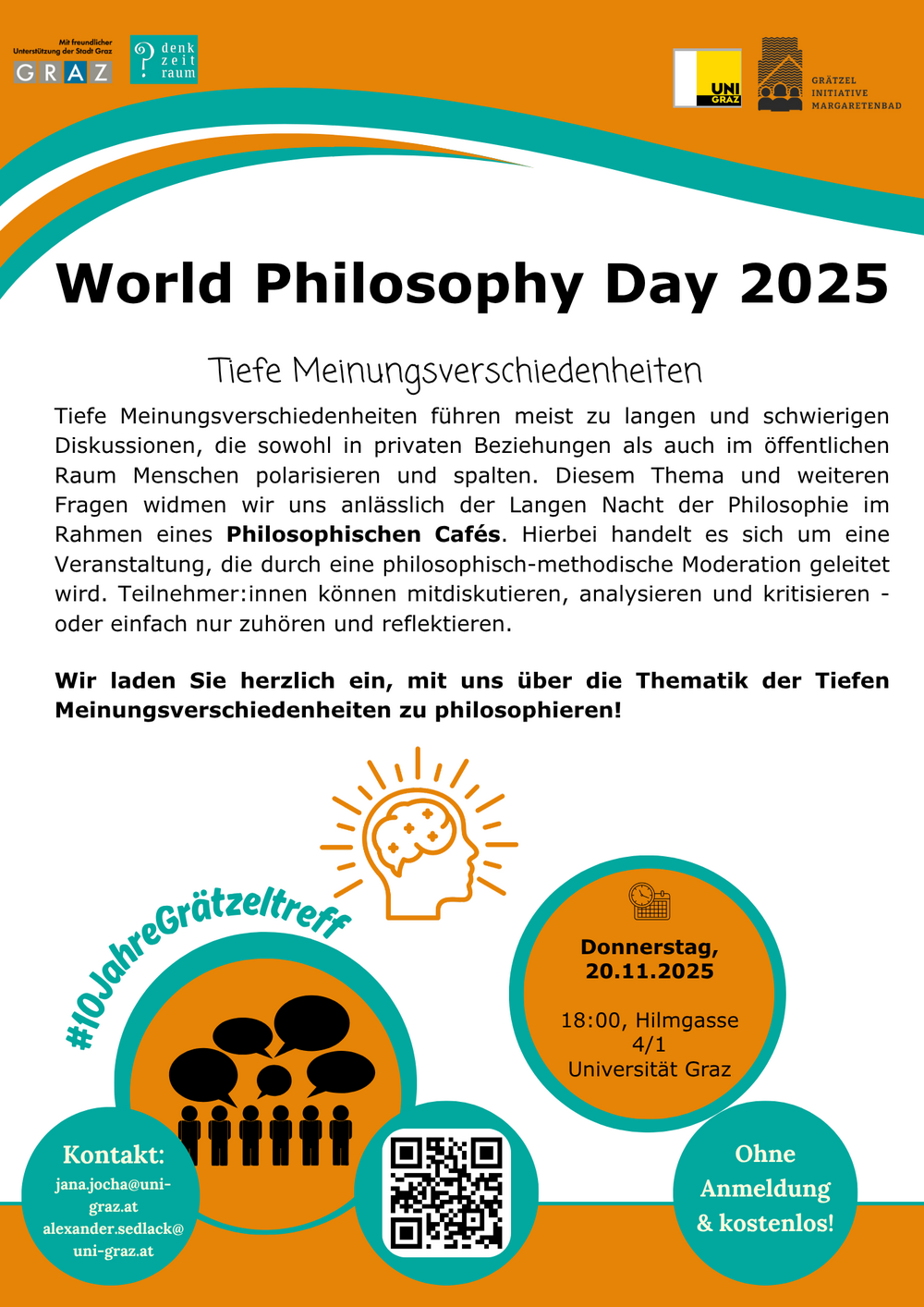
Workshop: Intergenerational and Global Justice
Title: Intergenerational and Global Justice: Approaches, Challenges and Responses
Where? Hilmgasse 4/1, SR 129.11 as well as online via Zoom: https: //uni-graz.zoom.us/j/4578115602?omn=65042452334
When? September 30, 9:00-19:30
The purpose of this workshop is to bring different scholarly perspectives together for knowledge exchange by giving students and staff the opportunity to provide and receive feedback in real-time on work in progress (draft chapters of dissertations and articles). Speakers are invited from universities from Europe, Israel, the United States and Brazil. This workshop will take place the entire day and focus will lie on bridging the perspectives of professors, students and pre-/postdocs. By including the topics on climate change within the domains of geoengineering, biodiversity, economy, and equality, the results from this workshop will be increased collaboration amongst junior and senior scholars on addressing challenges for global and intergenerational justice.
Alyssa Delarosa, PhD researcher and university assistant, Department of Philosophy, Section Moral and Political Philosophy
Practical Philosophy - Department of Philosophy
Jana Jocha, student assistant Department of Philosophy, Section Moral and Political Philosophy
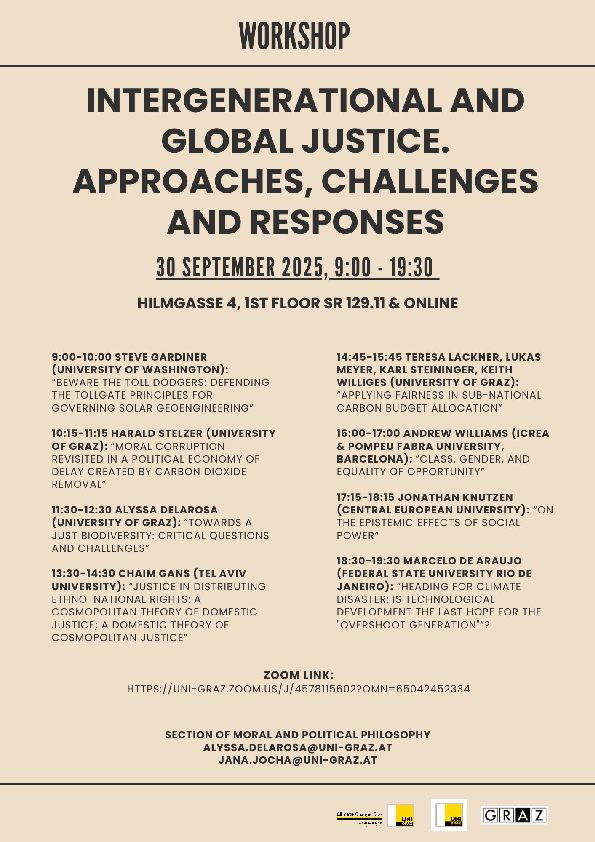
Uni Graz PhD Philosopher Named Early Career Researcher of the Year
Dr Kian Mintz-Woo (Uni Graz PhD 2018) was named University College Cork Early Career Researcher of the Year for his 2024 research. This builds on his work on climate justice published in Nature Climate Change (with a commentary published in the same journal). The purpose of this research was to produce an accessible, powerful and modular framework to guide the use of justice concepts in climate research, especially for modelling and scenario-building communities. This research helped guide his contributions to the Irish Government's Carbon Budgets Working Group.
"Much of my current work is interdisciplinary," Dr Mintz-Woo said. "And I honed the ability to speak across disciplinary boundaries at the Doktoratskolleg Klimawandel at Graz."
This is the first time that a philosopher has been awarded this prestigious award by UCC.
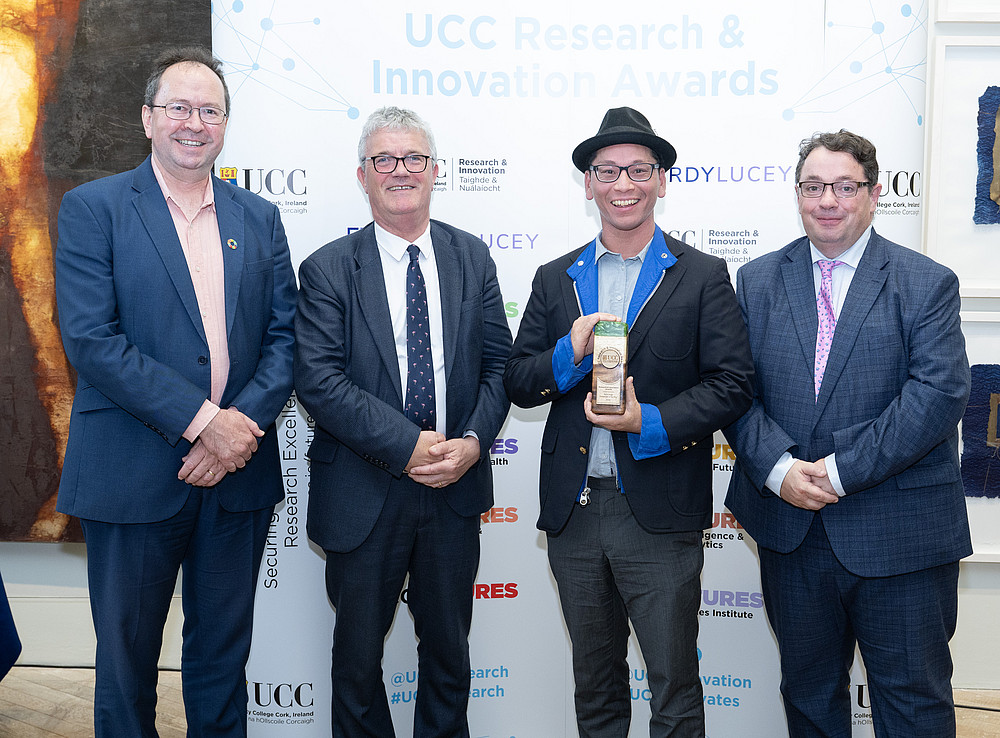
Visiting Scholar: Sebastián Rudas
Sebastián Rudas teaches political philosophy at the School of International Relations at the Getulio Vargas Foundation in Brazil. His current research project analyzes the intersections between Indigenous peoples' territorial rights and environmental protection
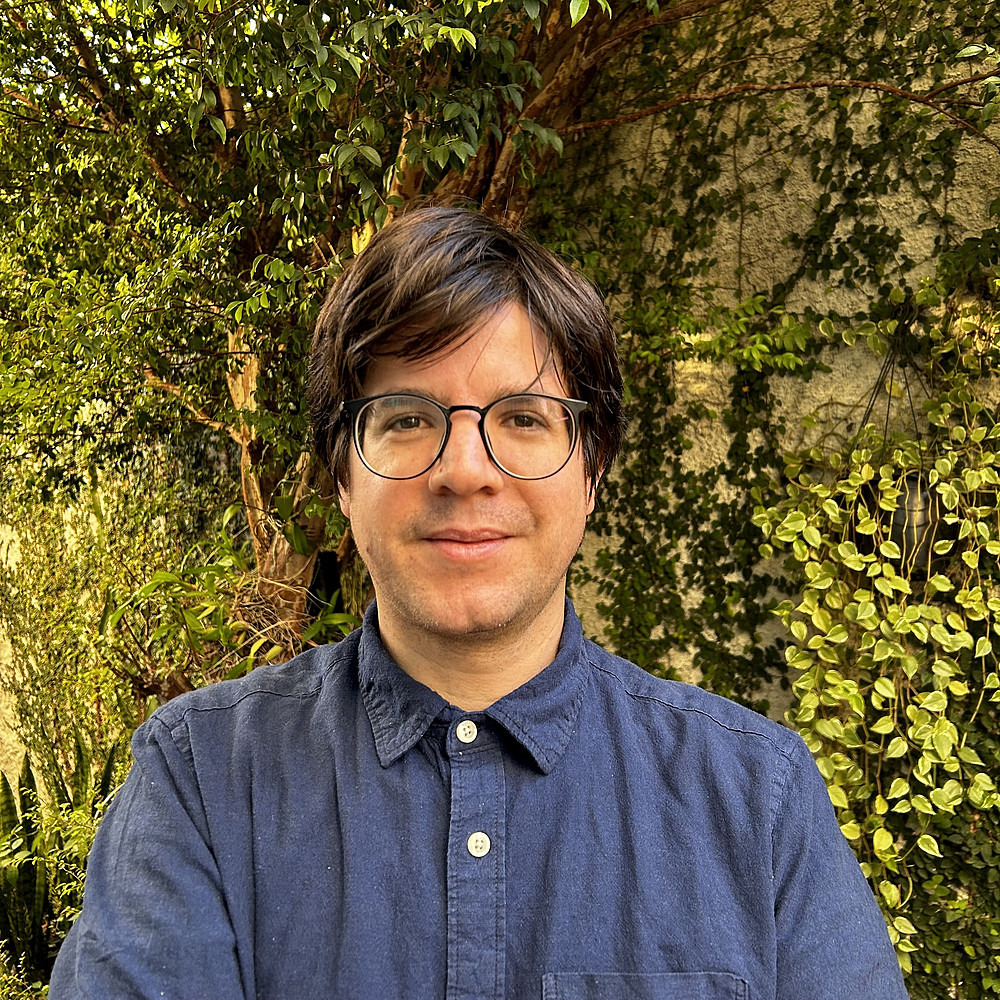
Challenges for International and Intergenerational Justice
Title: Challenges for International and Intergenerational Justice
Where? Hilmgasse 4/1, SR 129.11 as well as online via Zoom: https://uni-graz.zoom.us/j/69483068014
When? June 17, 9:00-19:30
The purpose of this workshop is to bring international multidisciplinary perspectives together for discussion, feedback and knowledge exchange. It is part of the colloquium from the section of moral and political philosophy chaired by Prof. Dr Lukas Meyer and Prof. Dr Julian Müller. The colloquium takes place every week and gives students and staff the opportunity to provide and receive feedback in real-time on work in progress for publishing and thesis' and dissertations.
On June 17th we will turn the colloquium into a workshop where we can deepen the process of knowledge exchange by inviting speakers from 5 universities across Europe and the United States. It will take place the entire day and focus will lie on bridging the perspectives of professors, students and pre-/post-docs. By including the topics on climate change within the domains of migration, litigation, liberalism, politics, war, peace and more, the results from this workshop will be increased interdisciplinary collaboration on addressing challenges for international and intergenerational justice.
We look forward to seeing you!
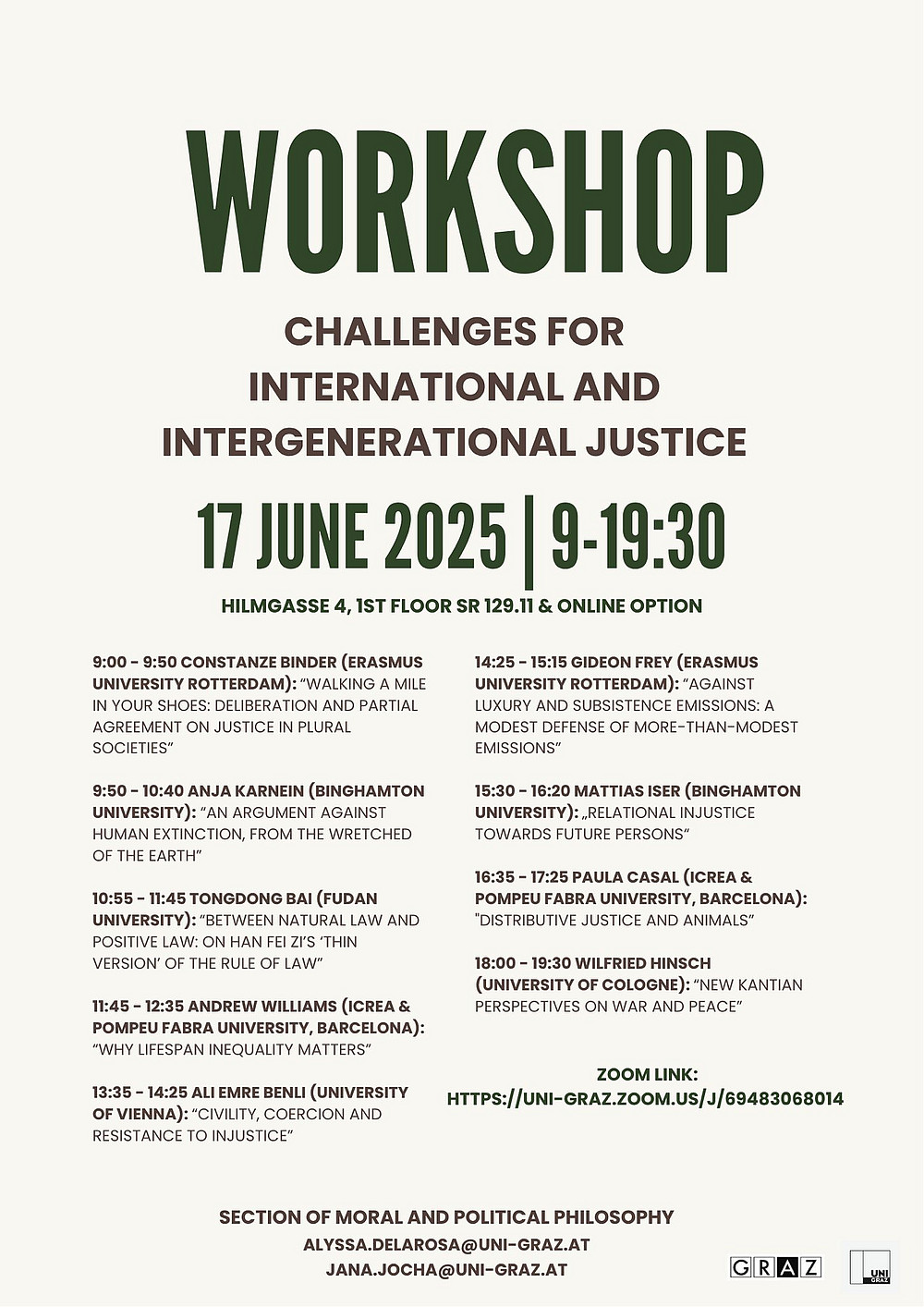
Interdisciplinary workshop 'A sustainable future with antimicrobial resistance. What can we learn from the climate transition?
We're hosting an interdisciplinary workshop on antimicrobial resistance and climate change
Let's talk about "What lessons can the climate transition offer for building a sustainable future with AMR?"
Date: 21-22 May 2025
Location: University of Graz and online
Register now: https://docs.google.com/forms/d/e/1FAIpQLSfEyE7ZKAORnMi2CL8FMnQ-PXk0LLzrJn8cluVWdbbzVXqclA/viewform
21 May
9:15 - 9:30: Lukas Meyer (Department of Philosophy, University of Graz): Welcome
9:30 - 11:00: Romina Rekers (Department of Philosophy, University of Graz) & Lena Marinova (Department of Philosophy-CEPS, University of Minho): Just transition with transitional justice for a future with AMR.
Moderator: Paloma Puljic
11:30 - 12:30: Sheila Varadan (University of Leiden)
12:30- 13:30: Jeroen Hopster (Department of Philosophy, Utrecht University): Socially transformative experience: advancing just transitions in the face of uncertainty.
Moderator: Lara Ferraz
16:00- 17:00: Alberto Giubilini (Uehiro Institute, University of Oxford): AMR, externalities, and tragedies of the common.
17:00- 18:00: Kian Mintz-Woo (Department of Philosophy, University College Cork): Reflections on Carbon Pricing and Internalising Externalities.
Moderator: Carla Kowanda
22 May
8:30 - 9:30: Lukas Meyer (Department of Philosophy, University of Graz): Basic Needs Sufficientarianism and AMR
9:30-10:30: Sonia Lewycka (Centre for Tropical Medicine and Global Health, University of Oxford): Tracing epistemic injustice in global AMR research
Moderator: Anna Relatic
11:30-12:30: Tess Johnson (Ethox, University of Oxford): Developing an ethical evaluation framework for mandatory guidelines on the responsible use of antimicrobials.
12:30- 13:00: Hermine Mitter (Institute of Environmental Systems Science, University of Graz)
13:00-13:30: Comments by Romina Rekers
Moderator: Alexander Sedlack
This event is part of the FWF project: A Political Conception of Transitional Justice and is supported by the Climate Change Field of Excellence Graz.
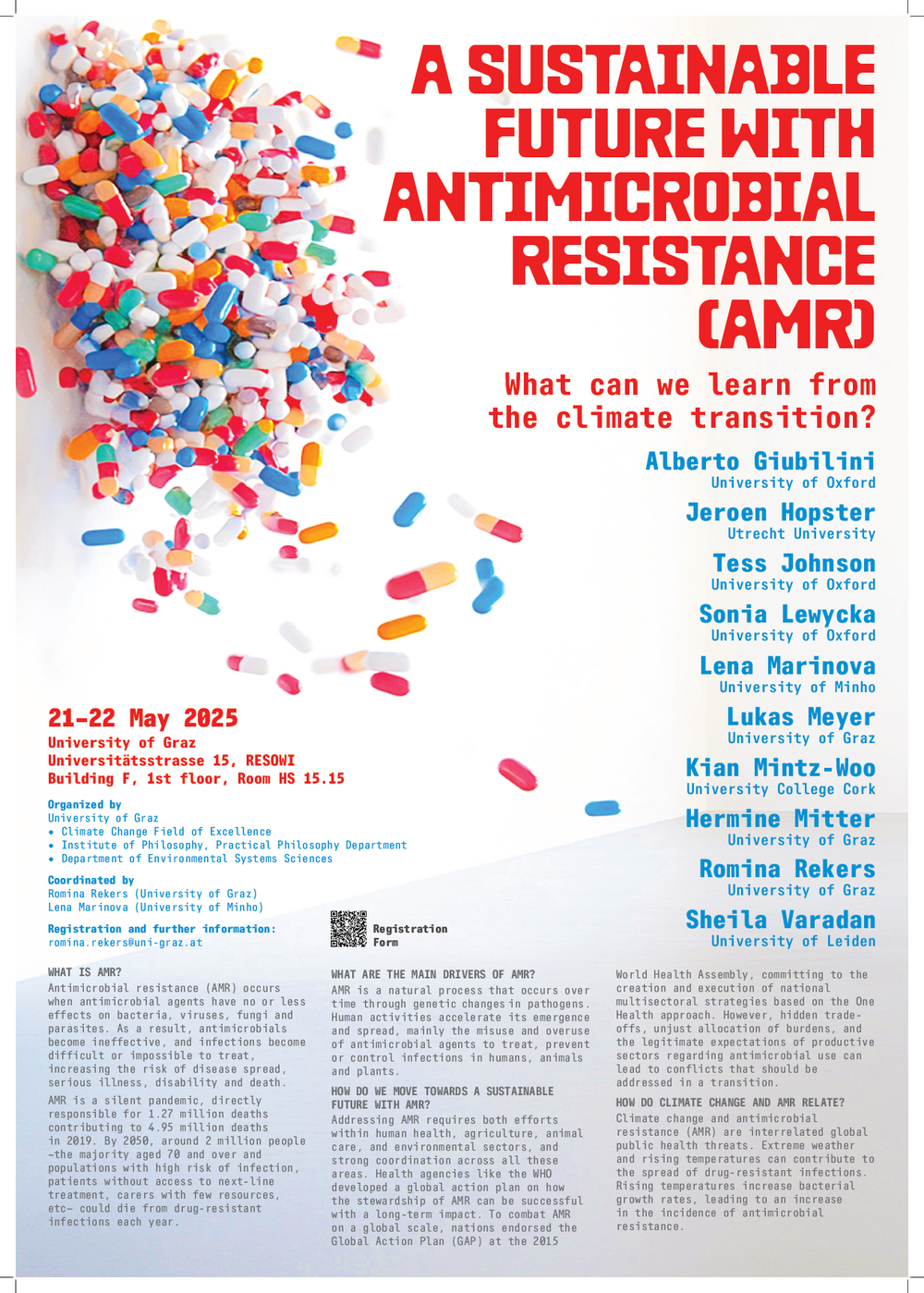
Lukas Meyer in conversation with Jörg Tremmel: "Intergenerational justice - the podcast"
Lukas Meyer is the guest in the second episode of "Intergenerational justice - the podcast". He talks to Jörg Tremmel about a variety of topics that are central to theories of intergenerational justice: the sufficiency justice he advocates, which he sees as securing basic needs; the question of the rights of future generations, as well as the importance of projects that reach into the future (and beyond our own lifetime) for ourselves. The role of cultural capital and how it is passed on to future generations is also discussed in detail.
Episode 2: Lukas Meyer's sufficiency theory of intergenerational justice (in German)
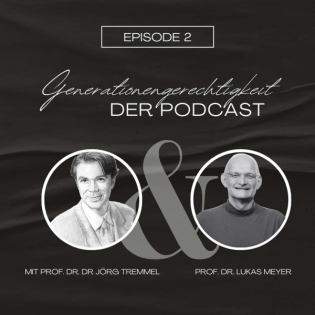
Drill, Baby, Drill? Climate Research and Climate Policy in the Wake of Trump's Return
the Section for Moral and Political Philosophy at the Department for Philosophy would like to invite you to join us for a round table discussion on the occasion of Trump's return to the White House. On the day of his second inauguration, January 20, we will meet to discuss the implication of his tenure for climate research and climate policy.
Title: Drill, Baby, Drill? Climate Research and Climate Policy in the Wake of Trump's Return
Where? Hilmgasse 4/1, SR 129.11 as well as online via Zoom(uni-graz.zoom.us/j/66123579990 pwd=Hb15DlZTyDW0ZMH9WDuLfju3PhsELv.1)
When? January 20, 4:30 pm
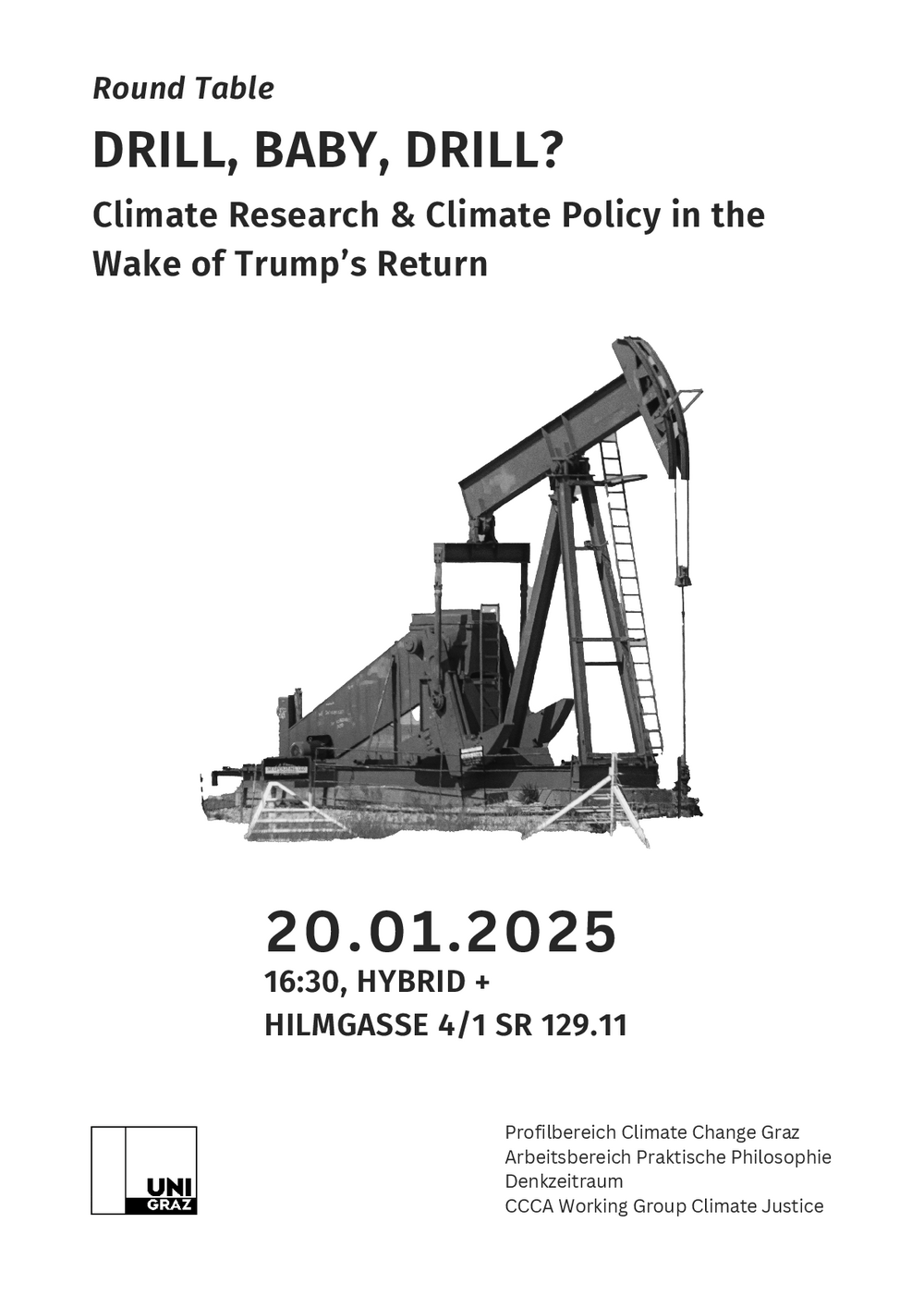
World Philosophy Day: Mental Load
Mental load - when one person thinks for the whole family:
Making breakfast, picking up the children from school, cooking, driving children to the sports club, booking a family holiday, buying a birthday present for the eldest, organising tutoring, changing winter tyres ...
Do these thoughts sound familiar? Do you also have the feeling that you have to think about everything all the time because nobody else is doing it? Mental load describes the mental strain caused by organising everyday tasks, which women in particular suffer from. This is by no means a new phenomenon: the French philosopher Simone de Beauvoir already criticised the social structures that force women into predetermined roles in her work "The Opposite Sex", depriving them of the space for self-determination.
But has the situation improved? How do women today perceive this burden? And what can we do to improve the circumstances?
As part of World Philosophy Day, Denkzeitraum, a project of the Department of Practical Philosophy, is organising a Philosophical Café in collaboration with the Grätzelinitiative Margaretenbad. This is an event led by a philosophical-methodical moderator. Participants can join in the discussion, analyse and criticise - or simply listen and reflect.
We cordially invite you to discuss the topic of mental load with us!
Drinks and snacks will be provided.
Time: 6 pm, 21 November 2024
Place: Department of Practical Philosophy, Hilmgasse 4/1, SR 129.11

Debating the Climate Corporate Tax - Pierre André (Climate Change Graz PostDoc fellow)
Debating the Climate Corporate Tax - Pierre André (Climate Change Graz PostDoc fellow)
Abstract:
Although the creation of a new fund dedicated to climatic loss and damage has been agreed at COP 27 in 2022, it remains unclear how it will be financed. Given the current insufficiency of climate finance, new policy instruments may have to be found. Recently, economist Esther Duflo has proposed the introduction of a global corporate climate tax in order to fund direct transfers to the victims of extreme weather events like heat waves, floods and droughts. It has been presented as a way to discharge the climatic "moral debt" that rich people in the global North have towards vulnerable people in the global South. In this paper, I want to assess the fairness of such an instrument. This raises both normative and empirical questions. On the normative side, there may be a tension between a corrective approach to corporate responsibility and a distributive approach to interpersonal justice. On the factual side, the fairness of a climate corporate tax may also depend on its economic incidence and on the carbon intensity of corporate profits.
Colloquium
Tuesday, 19th of November
17:00-18:30
SR 129.11 (Hilmgasse 4/1st floor)
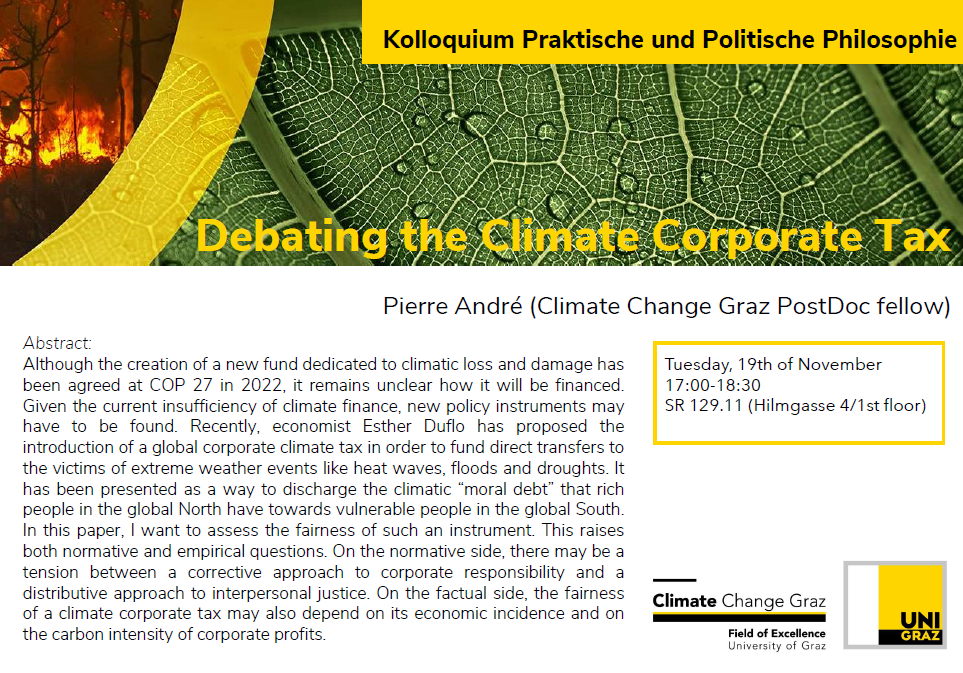
"Zufälle gibt's" a podcast about coincidences, impositions and courage with Barbara Reiter
The podcast "Zufälle gibt's" with Barbara Reiter has made it into the recommendations of the Süddeutsche Zeitung: "What happens when chance thwarts our plans? Happiness often arises precisely when the unexpected happens. We meet people whose lives have changed in a matter of seconds. A podcast about coincidences, impositions and courage."

The Role of Science in Society - CCCA Paper
Position paper of the Climate Change Centre Austria on 'The role of science in society' -- the result of a working group led by Lukas Meyer published online and in the journal GAIA:
International Conference on Philosophy for Children - Keynote by Lukas Meyer
Legitimate Expectations and Changing Circumstances
Legitimate Expectations and Changing Circumstances - keynote by Lukas Meyer at International Conference on Philosophy for Children, "Experiences and Expectations", In the Field of Tension between Philosophy, Science, Technology and Education. University of Graz, 15-16 November 2024
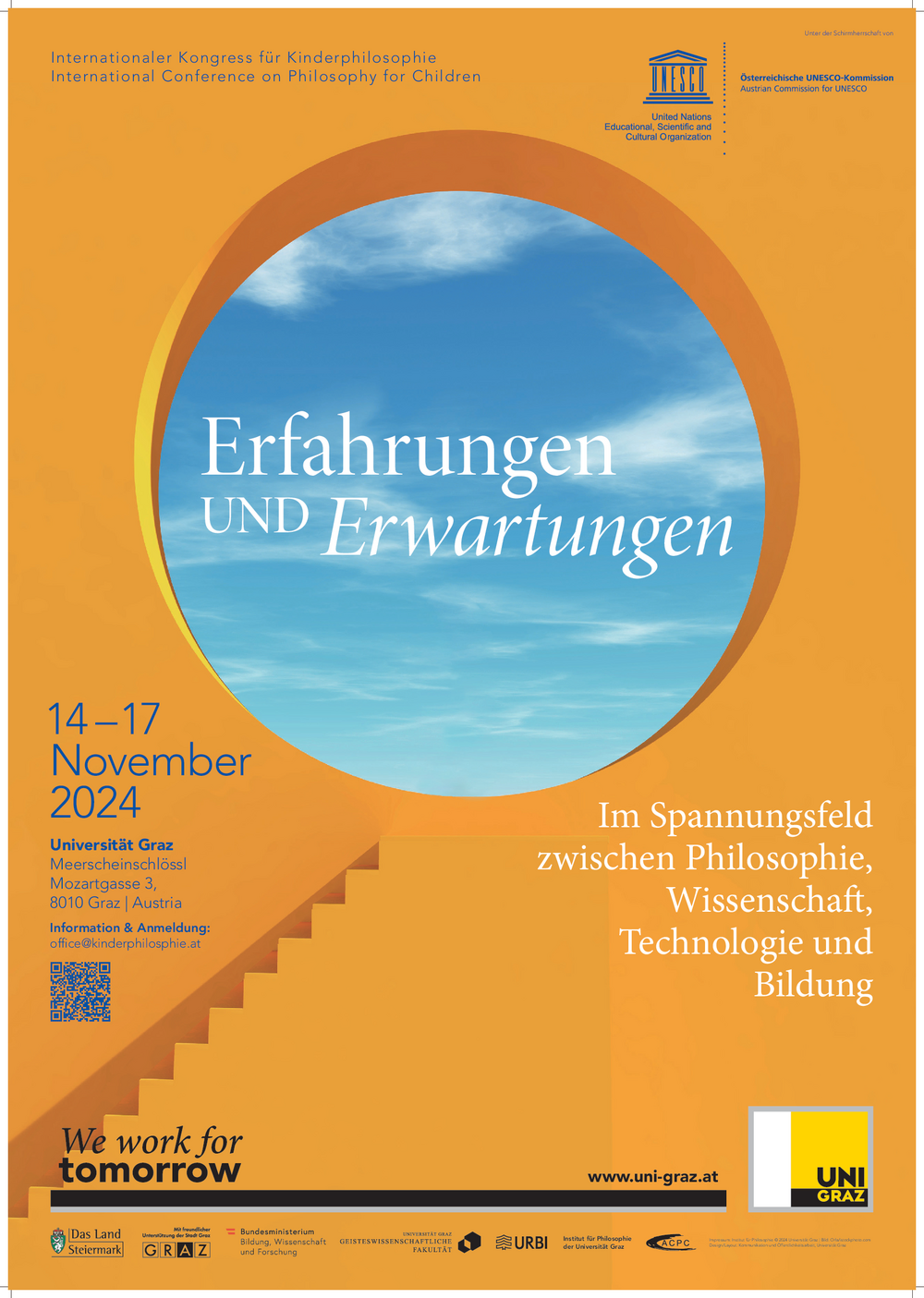
The energy transition in Austria and Europe: Conflicting goals and synergies with climate, biodiversity and environmental protection, competitiveness and social security
Colloquium on 8 November in Vienna
This dialogue between science and practice is jointly organised by the University of Graz, the Vienna University of Technology, the Embassy of the Federal Republic of Germany and the Austrian Club of Friends of the Alexander von Humboldt Foundation.
The energy transition is a task for society as a whole. Effective solutions that are supported by all social groups must be developed quickly. The colloquium aims to highlight the necessary steps from a scientific, technical, economic, social and political perspective, strengthen the dialogue between the various players in the energy transition and encourage new alliances.
In the morning, perspectives from science, politics, business and civil society will be presented by representatives from ETH Zurich, TU Vienna, University of Graz, BMK, Bavarian Ministry of Economic Affairs, WKO, Verbund, Green Energy Lab, Coordination Centre for Energy Poverty and Climate Alliance Germany, among others. In the afternoon, solutions will be jointly developed.
The event will take place in the Festsaal of TU Wien, Karlsplatz 13, 1040 Vienna on 8 November from 10:00 - 17:00
Please register here: https: //www.tuwien.at/forschung/kolloquium-energiewende
Prof. Bernward Gesang - Colloquium and Public Lecture
Prof. Bernward Gesang (University of Mannheim) will give two lectures at the University of Graz:
- On Tuesday, October 29 from 17:00: "Are interpersonal utility comparisons (scientifically) possible?" as part of the colloquium Practical and Political Philosophy - Flyer
- On Thursday, October 31 from 11:00 a public lecture on the topic "Donations instead of cycling? Individual obligations in climate protection" - Flyer
Both events will take place in the seminar room at Hilmgasse 4/1st floor.
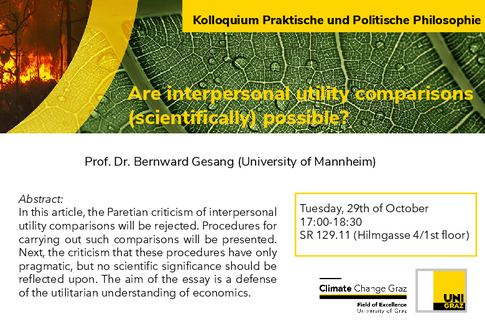
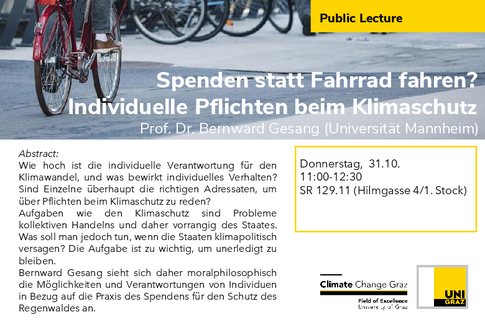
Book presentation by Santiago Truccone: Temporal Dimension of Justice. From Post-Colonial Injustices to Climate Reparations
Santiago Truccone presents his new book: "The Temporal Dimension of Justice. From Post-Colonial Injustices to Climate Reparations" at the "Institute of Law, Justice and Society Studies (Conicet-Córdoba)". The presentation and discussion will take place on 24.10.2024 in Spanish. There is the possibility to participate online: Registration.
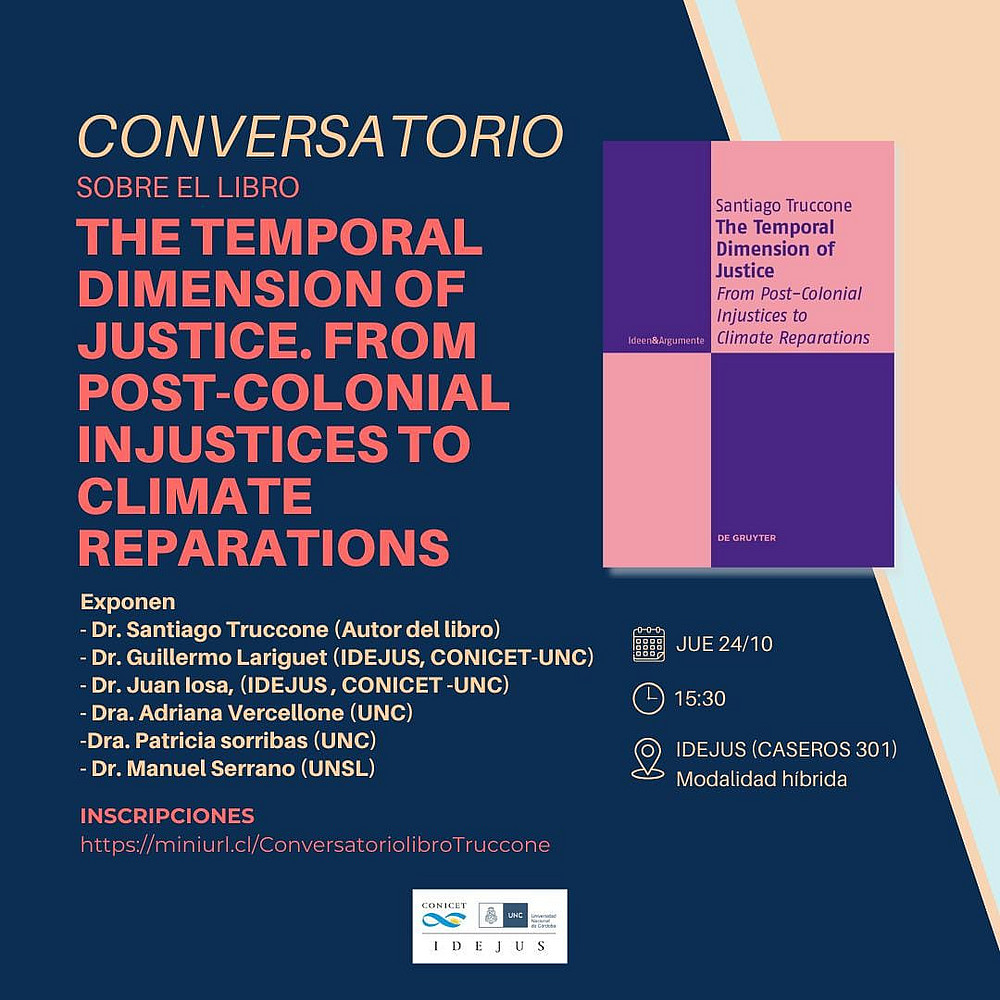
Excellent and climate-friendly: University of Graz presents Green Academia Award 2024
How can outstanding academic achievements and sustainable mobility be successfully combined when traveling on business? The philosophers at the University of Graz show how. On October 10, as part of the Sustainability Day, the branch of science received first prize in the Green Academia Award 2024, endowed with 50,000 euros, for achieving these combined goals. Earth Sciences came in second place, with a prize of 20,000 euros. Third place, with 10,000 euros, went to Environmental Systems Science.
"As the University of Graz, we have set ourselves ambitious goals on the path to true climate neutrality by 2040. The Green Academia Award is not only a recognition of outstanding scientific achievements, but also an incentive for the university to work together to set the course for a future worth living," said Rector Peter Riedler, who thanked this year's award winners for their commitment.
Researchers from the Wegener Center at the University of Graz, led by Gottfried Kirchengast, have developed their own calculation method to determine the three most successful branches of science according to the criteria of the Green Academia Award. The Department of Performance and Quality Management is assisting with the implementation. The calculation is based on a combination of the achievement of climate protection goals in the area of international business trips and the research goals with regard to high-quality publications in the year prior to the award ceremony.
The ten scientific disciplines that best meet their climate protection targets in accordance with the University of Graz's target and performance agreements with the Ministry each receive a recognition bonus of 1,000 euros. This year, this went to economics, sociology, theology, chemistry, educational sciences, business administration, sports sciences, pharmacy, molecular biosciences and history.
The Green Academia Award of the University of Graz was presented for the first time in 2023. The prize money is intended to benefit research and teaching. How they actually use the funds is up to the winners. Educational Sciences, which came first last year, supports sustainable education, research and social projects by staff and students, such as the innovative course "Eating our way through intersectional pedagogy. A teaching project in English language to connect intercultural learning and sustainability".
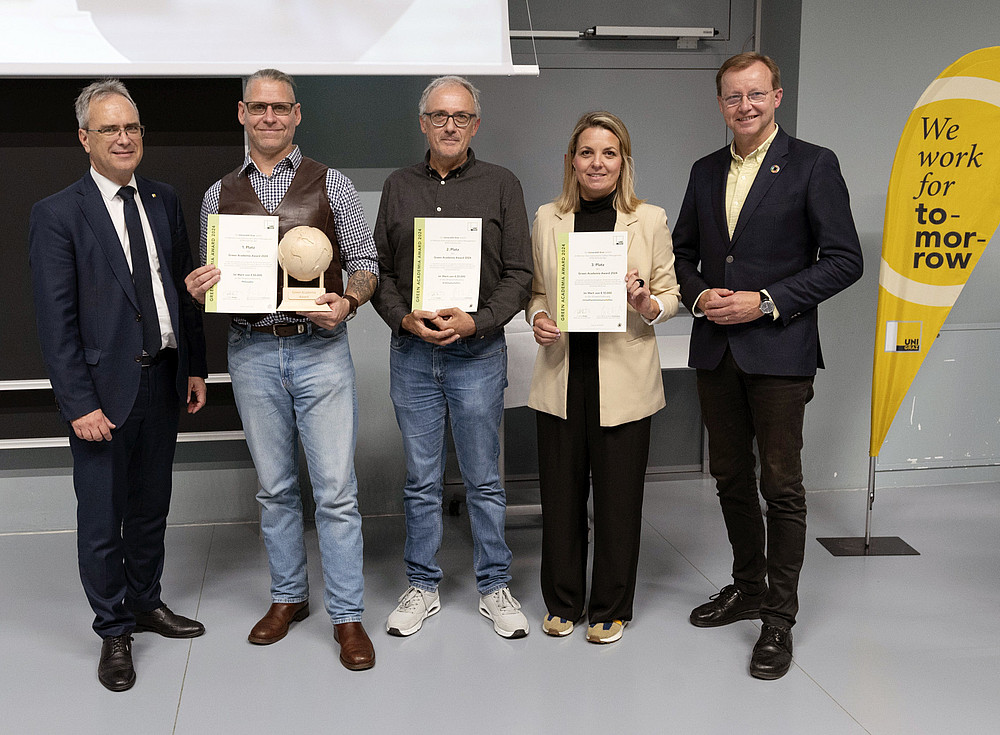
Science to Public and Public to Science Conversation “The Human Right to Health in the Climate Emergency”
Climate change is affecting population health through direct (e.g., heat) and indirect (e.g., VBDs) pathways. However, there is a lack of policy with climate-health linkages in many regions, some of which are already facing significant climate impacts on health. In response, the UN Human Rights Council recognized the right to a healthy environment in 2021, and the UN General Assembly did the same in 2022. The need for climate-health policies has motivated more than 120 countries to sign the Climate and Health Declaration at COP28, committing to integrate climate and health policy. Meanwhile, the WHO plans to develop a global climate change and health action plan by 2025. At the same time, these concerns have reached the highest courts in different regions (ICHR, ECtHR, ICJ).
This conversation aims to connect science and the public in responding to these questions: What are the obligations of states to protect the human right to health in the face of climate change? What is the level of protection required? What is the scope of state obligations? What legal tools do groups and individuals have to advocate for their human right to health? How can ethics embed climate-health research and policies?
This event will take place on June 20th 16:00-19:15 (CET) in a hybrid modality (University of Graz, Sitzungszimmer GEWI (Main building, Universitätsplatz 3) and Zoom: https://uni-graz.zoom.us/j/67435311133).
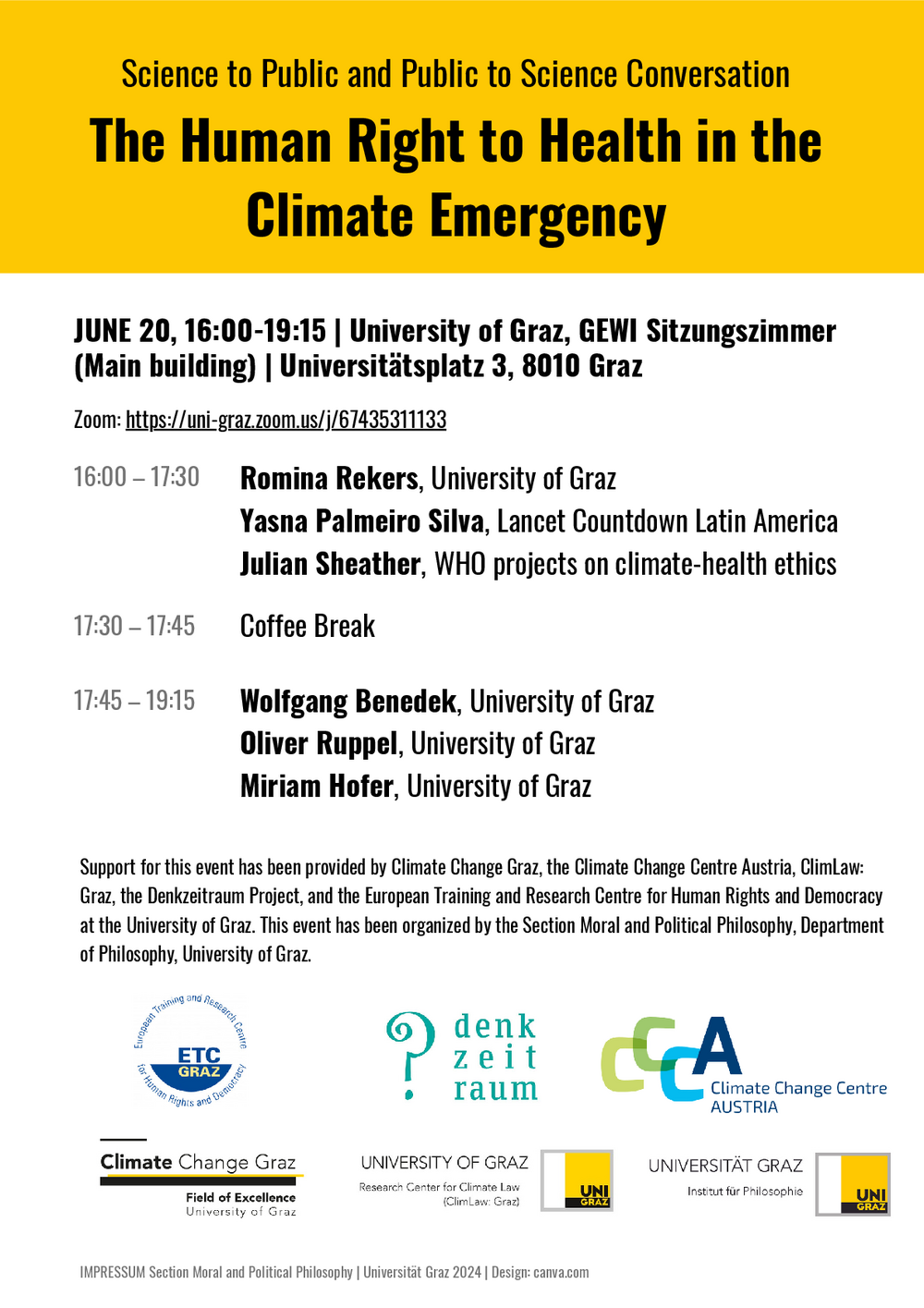
Colloquium Moral and Political Philosophy Guest Speaker Sessions
We are pleased to announce that four guest speaker sessions will take place in June as part of the Colloquium Moral and Political Philosophy:
JUNE 11 | SR 129.11 | 17 - 20
Assoc. Prof. Anja Karnein (Binghampton University): A Perfect Duty to Aid?
Prof. Michael Moehler (Virginia Tech): Diversity, Polycentricity, Justice, and the Open Society
JUNE 18 | SR 129.11 | 17 - 18.30
Assoc. Prof. Matthias Iser (Binghamton University): The Challenge of Futile Defense
JUNE 19 | Sitzungszimmer GEWI | 17 - 18.30
Prof. Georg Mohr (Universität Bremen): The Duty to Disobey. Taking Equal Basic Rights Seriously
You can receive the papers for the colloquia with Anja Karnein and Matthias Iser in advance. Please contact katharina.hiebaum@uni-graz.at
Everyone is welcome!
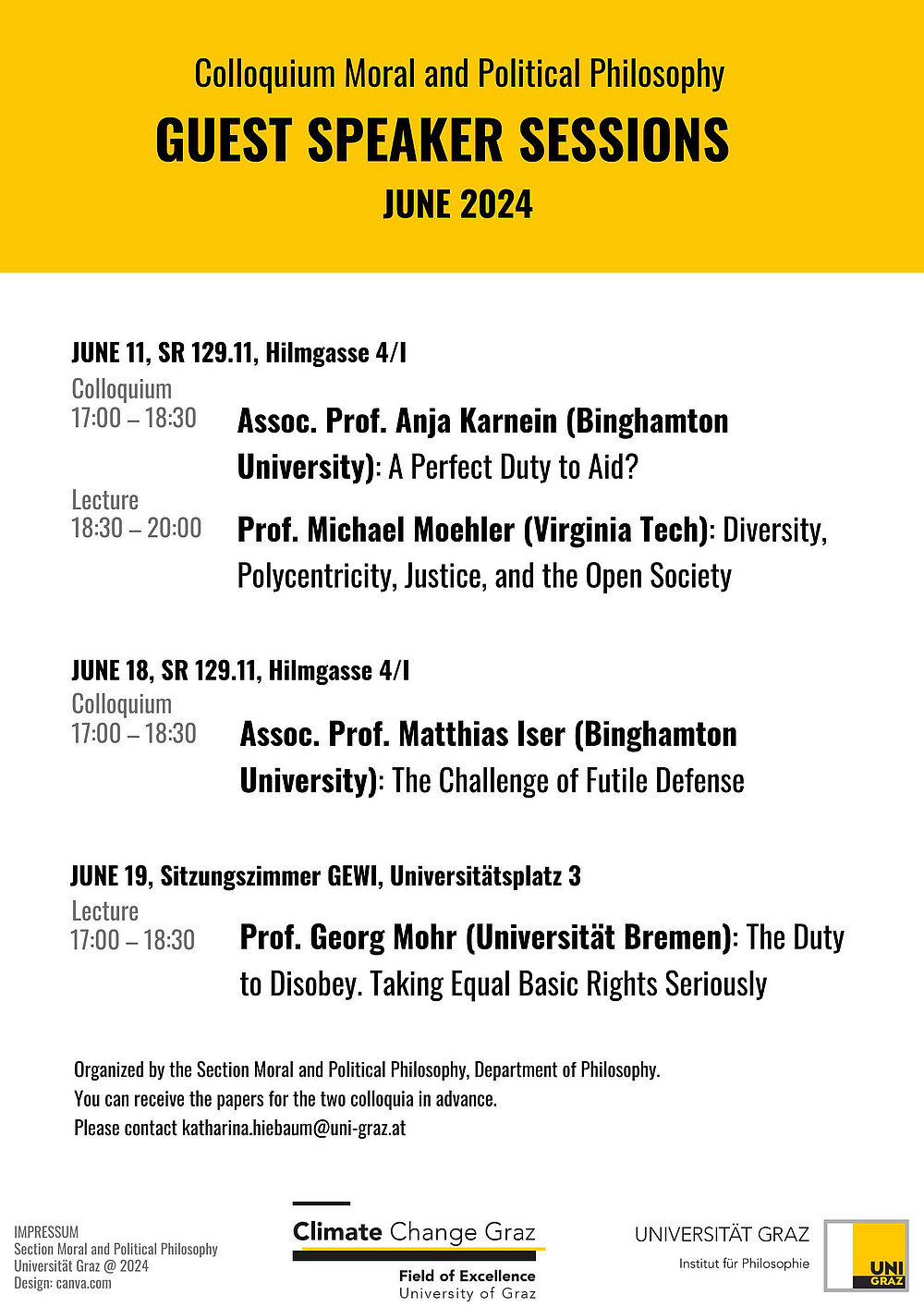
Climate disobedience: A critical exchange between Ross Mittiga and Georg Mohr
We warmly invite you to the event Climate disobedience: A critical exchange between Ross Mittiga and Georg Mohr
Speakers: Dr. Ross Mittiga (University of Graz) and Prof. Georg Mohr (University of Bremen)
Moderated by DDr. Santiago Truccone (University of Graz)
June 17, 2024, 15:15 - 16:45 | HS 10.11
You can receive a paper in advance, please contact ross.mittiga@uni-graz.at or katharina.hiebaum(at)uni-graz.at
Everyone is welcome!
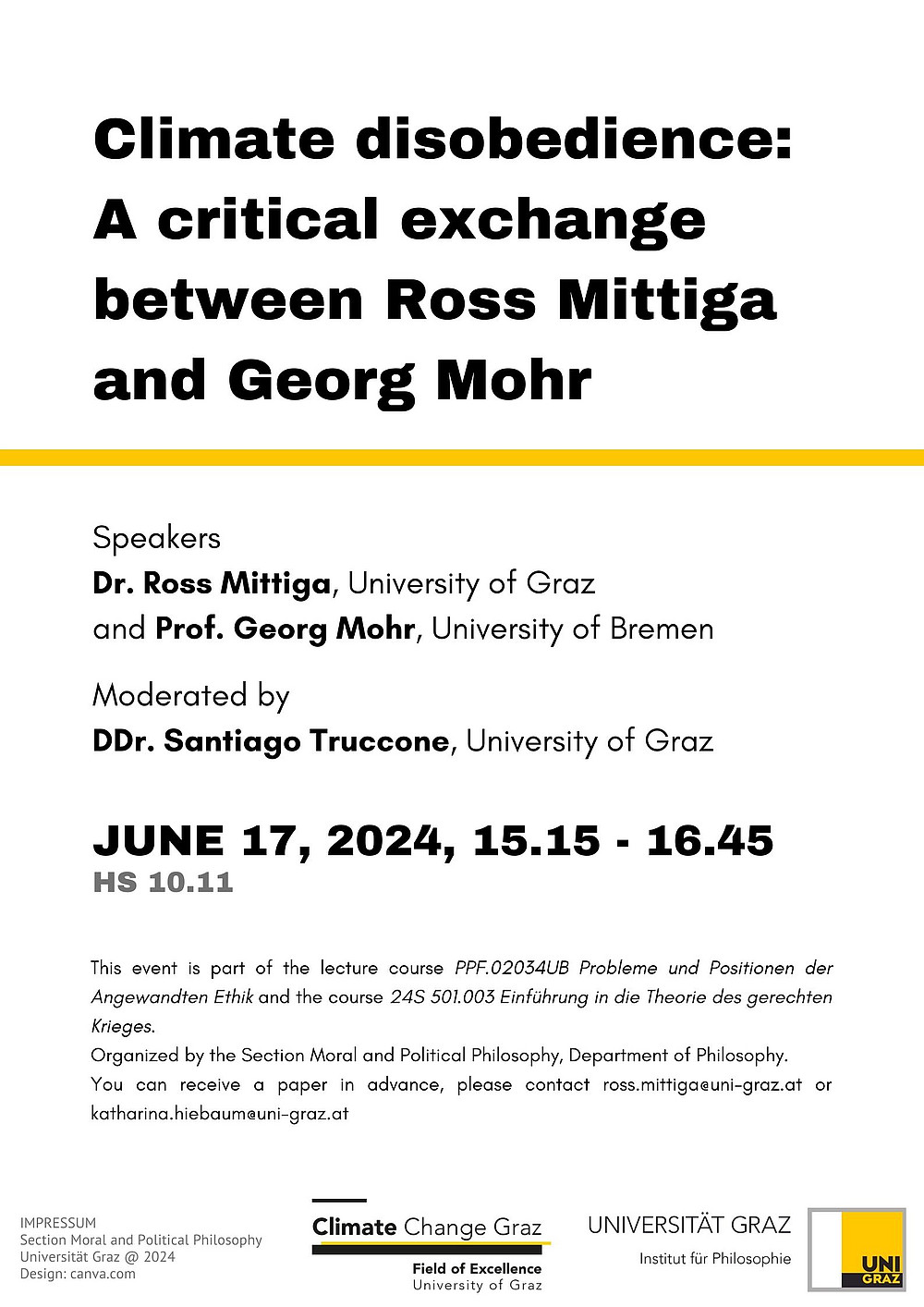
Philosophie kontrovers: Nachhaltigkeit
11.04.24 | 19.30 Uhr | Hörsaal VIII
Prof. Dr. Claus Leggewie (Giessen)
Freiheit oder Nachhaltigkeit? Freiheit und Nachhaltigkeit
Respondent: Prof. Dr. Marc Oliver Bettzüge (Köln)
08.05.24 | 19.30 Uhr | Hörsaal VIII
Prof. Dr. Lukas Meyer (Graz)
Wie sind Emissionen bei der Transformation zu Netto-Null-Emissionen gerecht zu verteilen?
Respondentin: Prof. Dr. Christina Bogner (Köln)
11.06.24 | 19.30 Uhr | Hörsaal VIII
Prof. Dr. Sighard Neckel (Hamburg)
Die Zwickmühlen der Transformation. Zum sozial-ökologischen Dilemma der Gleichzeitigkeit
Respondentin: Prof. Dr. Birgit Weber (Köln)
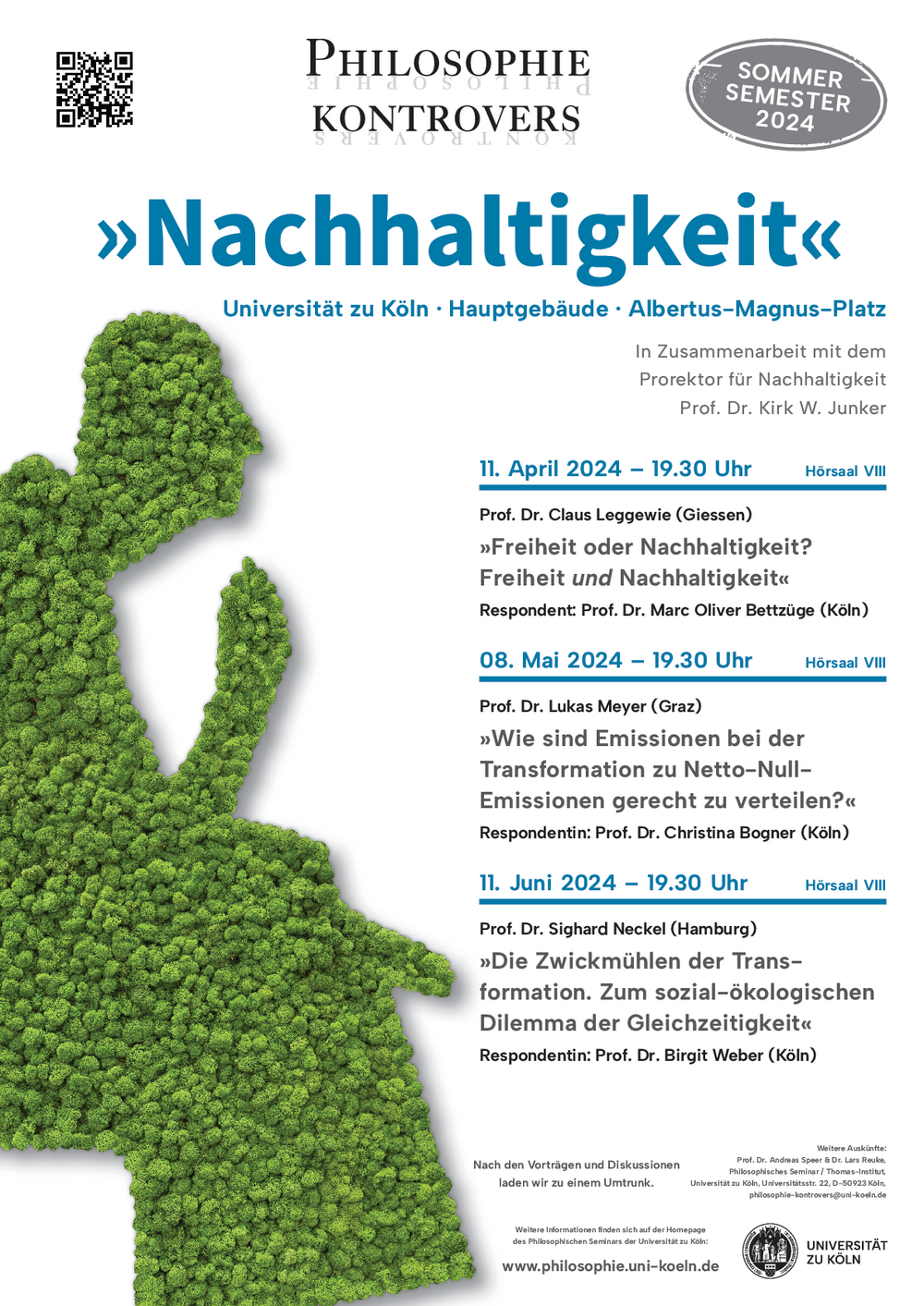
Climate justice: German Ethics Council refers to University of Graz research
In its recently published statement on climate justice, the German Ethics Council argues in favor of a sufficiency-based threshold concept, a position that was developed under the leadership of Prof. Lukas Meyer at the University of Graz. "According to this concept, firstly, all people are fundamentally entitled to the same opportunities to lead a good, successful life (egalitarian). Secondly, threshold values for important basic goods or capabilities, such as health, food, water, security or mobility, which must not be undercut (sufficiencyarian), must be determined as a minimum requirement for such a life. Thirdly, climate protection measures should be aligned in such a way that those who are most affected by climate change can reach the relevant thresholds as a matter of priority (prioritarian)."
Such an understanding implies far-reaching consequences in the design of climate policy, both in terms of mitigation and adaptation measures and the assumption of the associated costs, both at national, regional and international level.
The Ethics Council refers to the following research findings, among others:
Gosseries, Axel; Meyer, Lukas (eds.) (2009): Intergenerational Justice. Oxford: Oxford University Press.
Meyer, Lukas, Intergenerational justice. In: The Stanford Encyclopedia of Philosophy (Winter 2021 Edition).
Meyer, Lukas; Roser, Dominic (2009): Enough for the Future. In: Intergenerational Justice, ed. A. Gosseries and L. Meyer, 219-48. Oxford: Oxford University Press.
Meyer, Lukas; Roser, Dominic (2007): Intergenerational justice. The significance of future climate damage for today's climate policy.
For more on sufficiency justice, see in particular:
Meyer, Lukas; Thomas Pölzler, Basic Needs and Sufficiency (2021): The Foundations of Intergenerational Justice, in Stephen M. Gardiner (ed.), The Oxford Handbook of Intergenerational Ethics.
Meyer Lukas; Stelzer, Harald (2018): Risk-Averse Sufficientarianism. The Imposition of Risks of Rights-Violations in the Context of Climate Change. In: Ethical Perspectives 25, 3, 447-470.
For interdisciplinary research:
Keith Williges, Lukas H. Meyer, Karl W. Steininger, Gottfried Kirchengast (2022): Fairness Critically Conditions the Carbon Budget Allocation Across Countries. Global Environmental Change 74.
Lukas Meyer, spokesperson for the Section of Moral and Political Philosophy at the University of Graz and the Climate Change Graz profile area, was one of the first philosophers to be among the main authors of the World Climate Report and was head of the Austrian Science Fund FWF-funded doctoral program Climate Change - Uncertainties, Thresholds, Strategies. Former staff members now research and teach at renowned universities in Europe, such as University College Dublin, the University of Rotterdam, the University of Heidelberg, University College Cork, FU Berlin, the University of Stockholm and KIT.
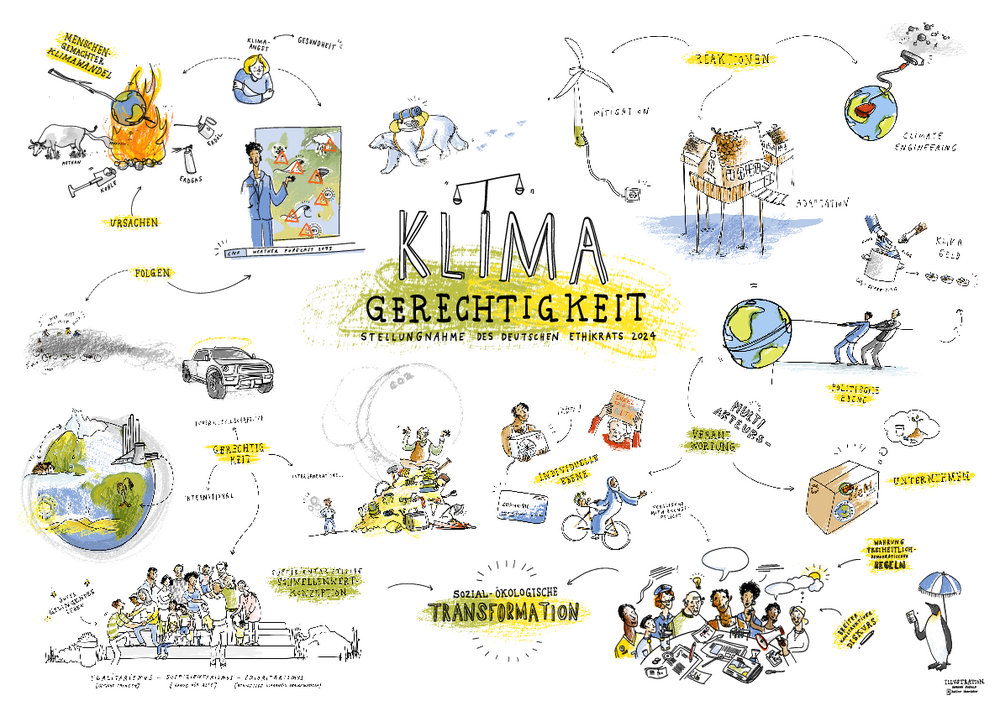
New Publication: Supersession and compensation for historical injustice
Lukas H. Meyer & Timothy Waligore (2024) Supersession and compensation for historical injustice, Critical Review of International Social and Political Philosophy, DOI: 10.1080/13698230.2024.2309051
Abstract
This article examines the relationship between Jeremy Waldron’s supersession thesis and compensation. Recently, Waldron has argued that claims for material compensation for the original injustice cannot be superseded. He limits supersession to issues of restitution. Waldron’s supersession thesis is frequently cited by opponents of claims based on historical injustice, so his view of compensation warrants close examination. In our article, we explain the details of Waldron’s ‘simple model’ of compensation, offer an internal critique of it, and try to sympathetically reconstruct it. We contend that a crucial claim about this model does not work; his model would result in many more backward-looking compensatory claims than he realizes. Waldron’s allowing for material compensation claims from historical injustice is in tension with, or incompatible with, his long-expressed view that the spirit of the supersession thesis is that justice should be forward-looking and look to present-day costs. We have argued elsewhere that the abstract possibility that restitution claims may be superseded due to changing circumstances (what we call the ‘supersession thesis proper’) is separable from the question of whether justice has a forward-looking or backward-looking orientation. We argue here that Waldron’s model of compensation can best be made sense of through our distinction of ‘full supersession’ and ‘partial supersession.’ This allows us to show that Waldron’s model relies on a more strongly backward-looking orientation than he seems to endorse in his earlier works on restitution and his most recent article discussing compensation. We conclude by offering external criticisms of Waldron’s model of compensation.

Julian Müller joined the University of Graz as Professor of Political Philosophy in April 2024
Julian F. Müller is Professor of Political Philosophy at the Department of Philosophy. He previously held postdoctoral positions at the University of Hamburg and Brown University. During his doctorate at the Technical University of Munich, he was a visiting scholar at the University of Arizona and the Chinese People's University, among others.
His research in political philosophy revolves around the concepts of progress and freedom. He is particularly interested in the question of how modern societies should deal with reasonable and unreasonable disagreements. His research on dealing with reasonable disagreement has been awarded the Roman Herzog Research Prize for Social Market Economy (2017) and the Werner von Melle Prize (2016), and has appeared in renowned international journals such as Philosophical Studies, Episteme and Synthese. In 2019, his monograph Political Pluralism, Disagreement and Justice was published by Routledge. Most recently, he has been working on the phenomenon of populism. His article "An Epistemic Account of Populist Ideology" was recently published in Episteme, in which he presents an innovative epistemic theory of populism.
In applied ethics, he deals primarily with questions of markets and morality and questions of the ethics of artificial intelligence. His contributions on these topics have been published in the European Journal of Political Theory, in Moral Philosophy and Politics and Science and Engineering Ethics among others.
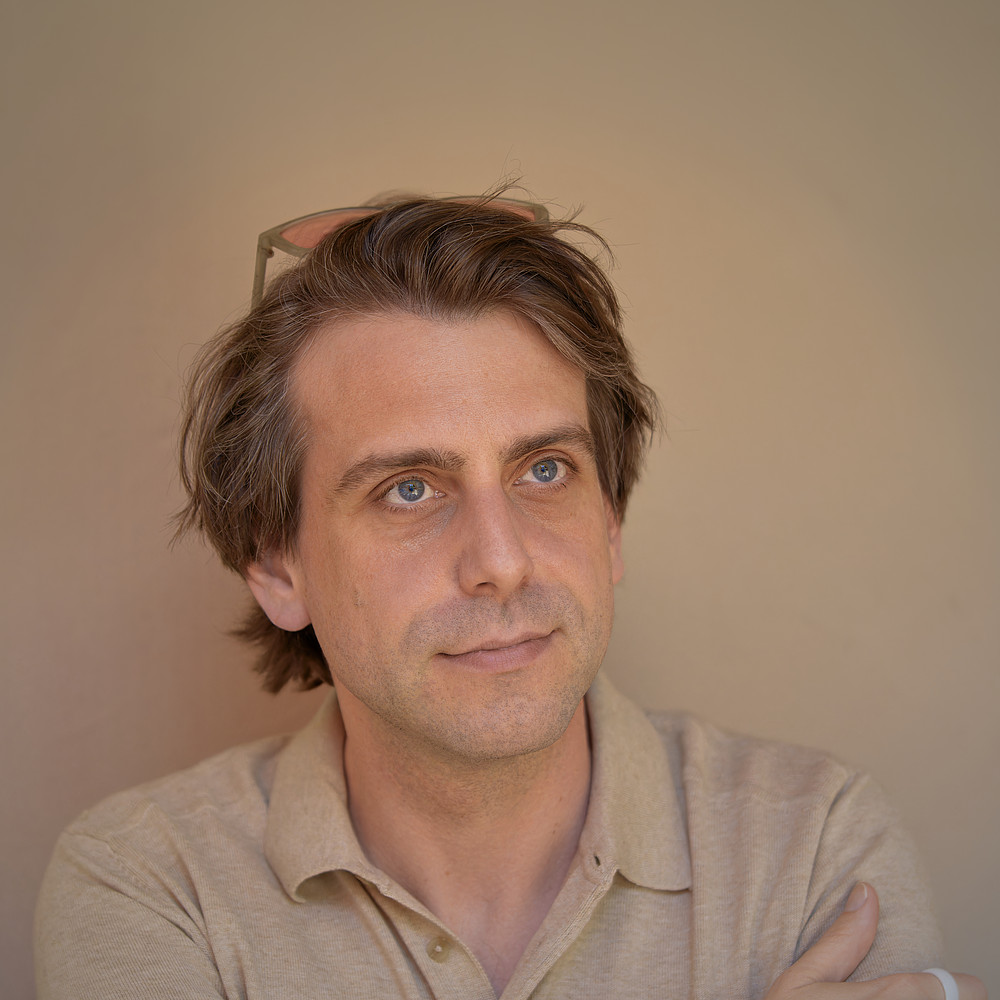
Harald Stelzer started as a (Senior) Scientist at the Section and is the new study coordinator for the PELP Master's program
March 2024
Harald Stelzer is a (senior) scientist at the Section Moral and Political Philosophy and is the new study coordinator for the PELP Master's program. He is a member of the Field of Excellence Climate Change Graz at the University of Graz, where he has been working as research manager since 2019. Previously, Harald was Professor of Political Philosophy at the Institute of Philosophy at the University of Graz (2014-2019). His previous research stays have also taken him to Germany, where he worked as a project scientist at the IASS (Institute for Advanced Sustainability Studies) in Potsdam, as well as to the USA to the University of Washington as a Fulbright Visiting Scholar and Lecturer and to the University of Minnesota, where he worked as a research assistant at the Center for Austrian Studies during his PhD. He was involved in various FWF and EU projects.
His research focuses on the development of criteria that can be used for the normative assessment of technologies and climate change pathways. An important background in this context is the question of the extent to which technical solutions can provide an adequate answer to sustainability problems. Ideological and normative considerations on the role of science and technology in solving behavioral problems play an important role at both an individual and collective level. An extension of his research, which he will now be working on as a Senior Scientist, is the question of the changing relationship between humans and nature, which plays a decisive role in social transformation processes. Questions of balancing interests play a major role in all of these topics. These processes are particularly interesting from a normative perspective, especially when they take place under conditions of uncertainty and involve balancing risks in the future and existing interests in the present.
Harald loves to spend time in nature and has become one of the leading wildlife photographers in Austria. So do not forget to check out his Instagram account: https://www.instagram.com/wildnature_harald_stelzer/
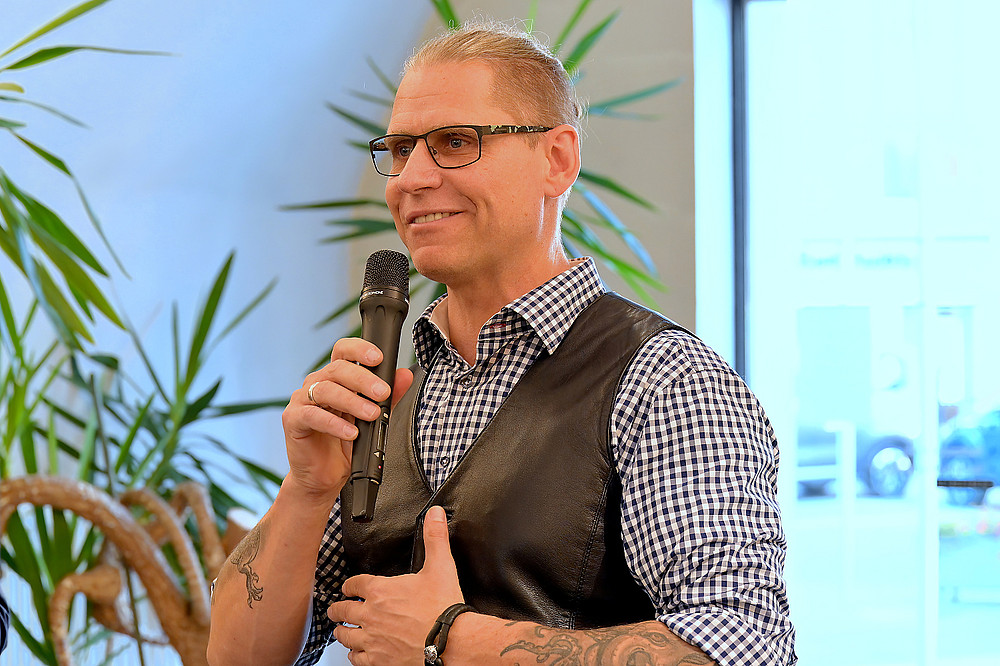
Santiago Truccone started as a university assistant with doctorate at the Section in February 2024
Research: My current research focuses on climate and intergenerational justice, specifically examining how climate burdens should be distributed globally and within countries. Concerning the global distribution of climate burdens, I am exploring two main aspects. Firstly, I am searching for the best possible normative responses to the objections that deny historical moral responsibility for global warming. Secondly, my present research investigates the conditions, if any, under which emissions of greenhouse gases could warrant criminal punishment.
Concerning the distribution of climate burdens within countries, I am working on how a transition to net-zero emissions societies should be carried out. Concerning this research topic, I assess and investigate into two key areas: the normative relevance of legitimate expectations regarding greenhouse gas emissions and how their frustration may justify compensation during the transitional process; and how procedural and substantive justice can be integrated into policy design aimed at achieving a carbon-neutral society.
My papers have appeared in the European Journal of Political Theory, Moral Philosophy and Politics, Critical Review of International Social and Political Philosophy and Environmental Values, among others.
Former positions: Before this position, I was University Assistant with Doctorate from October 2022 till January 2024, and ÖAW (Austrian Academy of Sciences) Post-DocTrack Fellow from May 2022 till September 2022. I have been a member of the Österreichische Forschungsförderungsgesellschaft project “JUSTDECARB”, the Austrian Climate Research Program (ACRP) project “LEXAT”, the Austrian Science Fund (FWF) project Historical Injustice and Changed Circumstances, and of the the Fogarty International Center (NIH) and Latin American Faculty of Social Sciences (FLACSO) project “The Ethics, Climate Change and Health (ECCH) Mentorship”. Before coming to Austria i had a doctoral fellowship by the National Scientific and Technical Research Council - Argentina (CONICET)
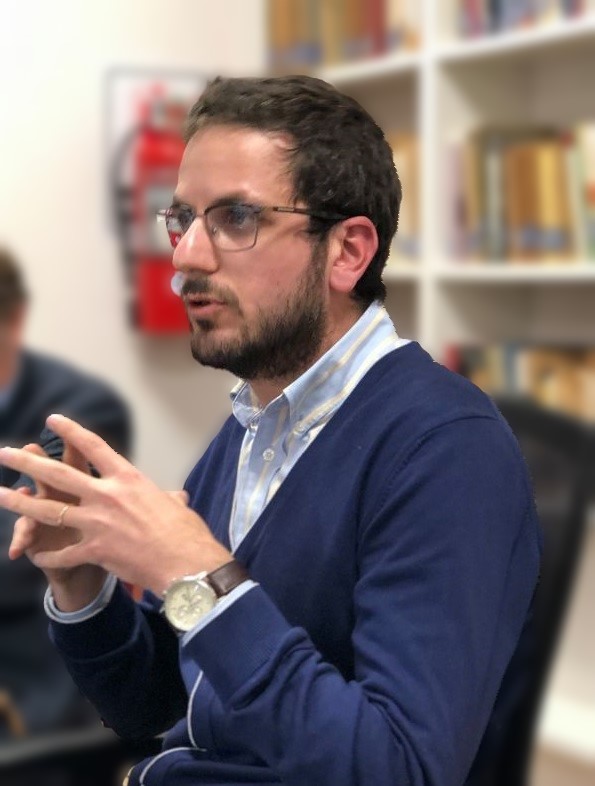
Rutger Lazou will start as postdoctoral researcher at the University of Heidelberg in May 2024
Rutger Lazou received his doctorate from the University of Graz in January 2024 with a dissertation titled "What is Owed to the Losers of the Energy Transition? The Case of Fossil Fuel Reserve Owners" under the supervision of Lukas Meyer (supervisor) and Birgit Bednar-Friedl (co-supervisor). From 1 May 2024 onwards, Rutger will start working as a postdoctoral researcher at the University of Heidelberg where he will teach political and practical philosophy and where he will do more research on issues related to the just energy transition:
"In my new research project, I would like to focus on the gaps in the literature I identified during my doctoral research, relating to the role of expectations in the context of just transitions. The literature, I noticed, has only focused on whether existing expectations justify measures such as grandfathering or compensation, without investigating which duties there are to actively create expectations. An additional limitation of the existing literature is its narrow focus on expectations about regulatory change, while the relevance of expectations about economic and physical change is not discussed. Finally, the existing literature has focused only on how high emitters should be able to rely on expectations. Expectations about the future, however, are also important for those who benefit from societal change.
My research project will address these gaps in the literature by exploring which duties regulators have to create expectations both about regulatory and non-regulatory change and both towards losers and winners of the energy transition. I divide this central research question into three subquestions, i.e. why, when, and how regulators should create expectations. The question of why to inform leads to further questions about whether having correct expectations is intrinsically or instrumentally valuable, what the responsibilities of governmental agents are to inform, and what the responsibilities of non-governmental agents are. The question of when to inform will be given most attention and leads to three further questions. Firstly, I will investigate how to deal with the limits to governmental agents' capacities to provide information and citizens' capacities to process information. Secondly, I will investigate how governmental agents should deal with uncertainties about future changes, related to both the uncertainty about physical change and the lack of predictability of regulatory change that arises as a consequence from the fact that, at least in democratic regimes, governments change. Thirdly, I will investigate the normative relevance of the performative role of expectations, which refers to the fact that expectations affect the likelihood that the climate transition will succeed, and what this implies for the duty to provide reliable expectations that increase agents' ability to plan. The question of how to inform leads to further questions about the channels through which one should inform, how one should make information understandable, and the timing of the release of the information."
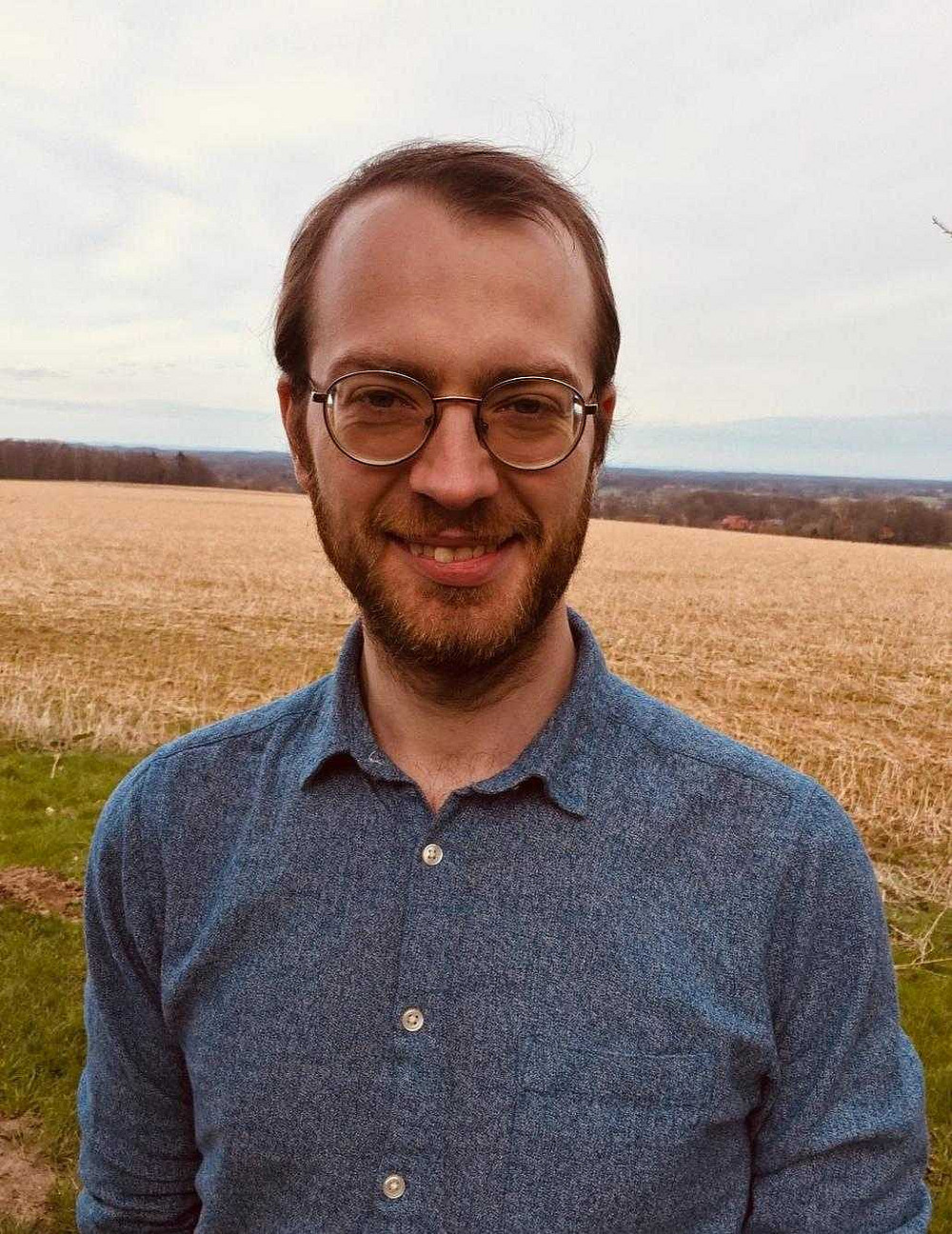
Dissertation Rutger Lazou
What is Owed to the Losers of the Energy Transition? The Case of Fossil Fuel Reserve Owners
With his dissertation with the titleWhat is Owed to the Losers of the Energy Transition? The Case of Fossil Fuel Reserve Owners , Rutger Lazou received his doctorate from the University of Graz in January 2024. The thesis was supervised by Lukas Meyer and co-supervised by Birgit Bednar-Friedl. We congratulate him on his graduation!
Abstract
The knowledge of the dangerous and irreversible effects of climate change due to the emissions from fossil fuel use necessitates one of the greatest challenges humanity has ever faced: the transition towards a low-carbon society and economy. Although realizing the energy transition would avoid immense harms, it also imposes significant transitional losses on some agents given the benefits they can no longer realize. This gives rise to the question of what is owed to these transitional losers, the agents who are disadvantaged by the transition succeeding. In this dissertation, I analyze the existing theories that have responded to this question, mainly by focusing on the concept of legitimate expectations. I develop an account on the normative relevance of expectations and clarify the role this plays in a general theory of just transitions. I apply this to the case of fossil fuel owners, whose reserves represent a large and clearly defined category of potentially stranded assets.
According to my account, fossil fuel owners who should keep their reserves in the ground according to general principles of justice can claim limited transitional measures based on expectations about regulatory stability. These general principles of justice require that about two thirds of the proved recoverable fossil fuel reserves remain unproduced, mostly in countries that are wealthy or have a lot of carbon intensive fossil fuels. I reject arguments for transitional measures that rely on libertarian values, distributing mitigation burdens instead of the remaining benefits, the intrinsic value of conservatism, or feasibility. Legitimate expectations, I argue, refer to the relevance of promises (the Rawlsian understanding) or expectations (the Humean understanding). Promises about production permissions made in laws and contracts should be considered in transitioning, I contend. However, they are only made by states towards companies, there is no strong, centralized regulatory body on the international level that could ground similar claims for states that own fossil fuels and they only concern the past or the near future. Moreover, since they should be just before they may be fulfilled, they do not justify fossil fuel productions that are inconsistent with the fair budgets of the countries where they would find place.
When promises about production permissions are lacking or unjust, I argue, expectations may still justify transitional claims. Based on their expectation of regulatory stability, fossil fuel companies have invested substantial sums in explorations and extractive infrastructures. Forward-looking views on the relevance of expectations that focus on the interest to have one's expectations fulfilled only lead to positive duties of charity to fulfill these expectations. To explain how expectations can ground duties of justice, I develop a backward-looking account according to which states should compensate fossil fuel companies if they are responsible for the harm they caused by creating false expectations about regulatory stability. For this to be the case, causing the expectation-related harm should be avoidable and foreseeable. This explains why expectations should be reasonable before they can be legitimate, which is the case for expectations that were created before states pledged to mitigate climate change under the Paris Agreement. Importantly, I argue, states should only compensate the costs of relying on the expectation of regulatory stability in terms of investments, since only these costs would not have occurred if they did not create those expectations. They should also actively create expectations about future regulations, the probability of change, and its determining factors, given their capacities to control and predict future regulations and their special duties towards fossil fuel companies over whom they exercise a right to rule.
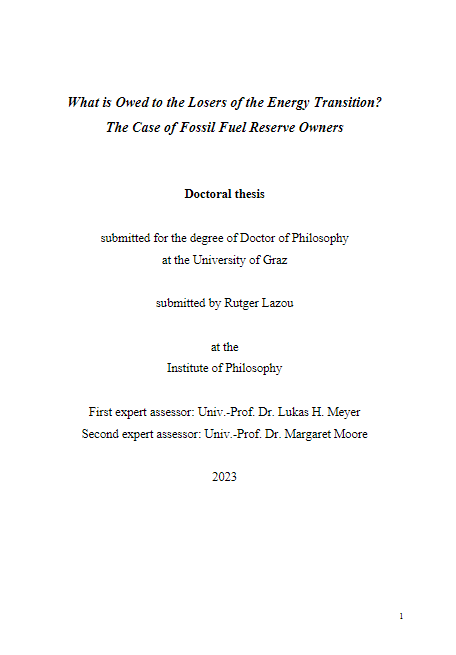
Lukas Meyer has been MOPP Editor in Chief since 01.01.2024
About this journal
Moral Philosophy and Politics (MOPP) is an international, peer-reviewed journal that publishes original philosophical articles addressing matters of public relevance. The notion 'public relevance' is construed broadly to encompass various domains and aspects. The journal has a special focus on the philosophical assessment of policies and their normative foundations, analyses of the philosophical underpinnings or implications of political discourse, and discussions of the justice or injustice inherent in social and political structures that govern human conduct.
MOPP is committed to the ideals of clarity, evidence-based reasoning, and intellectual openness. interdisciplinary work and historical approaches are encouraged when they are relevant to contemporary issues. MOPP considers both theoretical and meta-ethical works, as well as those tackling conceptual problems, provided they offer insights into political, moral, economic or social issues that characterize contemporary societies. Contributors are expected to make clear how their work relates to these issues.
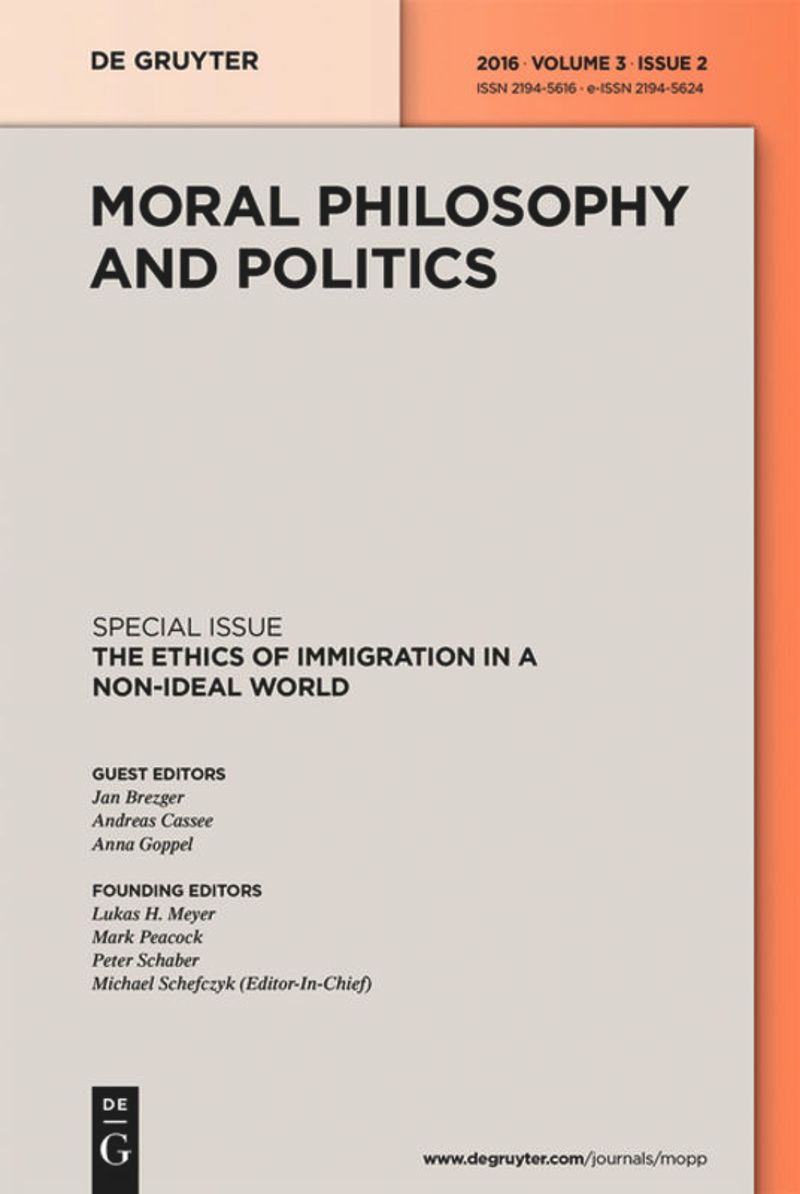
The Department of Philosophy During the Nazi Era
The Student Council for Philosophy, in cooperation with the Section Moral and Political Philosophy, has investigated the Nazi past of the Department of Philosophy at the University of Graz and published the results in a brochure with the title "Kontinuitäten und Brüche. Das Grazer Philosophische Institut im Nationalsozialismus".
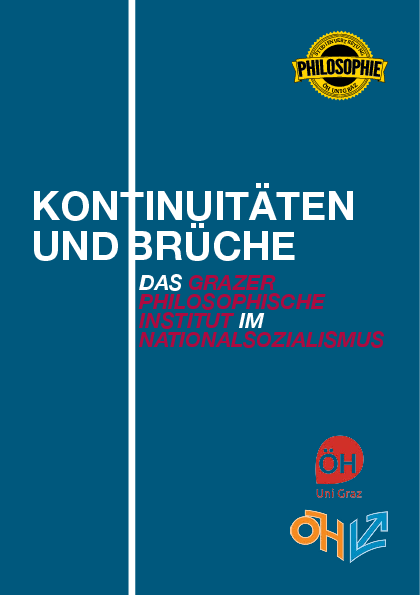
International Conference “Climate Change and Needs-Based Justice: From Theory to Application”
Department of Philosophy | Section Moral and Political Philosophy
We are pleased to invite you to the final conference of the project: Basic Needs and Intergenerational Climate Justice. The project, led by Prof. Dr Lukas Meyer, runs from 1 October 2020 to 30 September 2024 and is funded by the Austrian Science Fund (FWF). The project aims to contribute to assessing the climate-related intergenerational equity obligations of states from the perspective of a needs-based principle of sufficiency. In this two-day conference we would like to present some of our results and discuss them with international scholars and stakeholders.
University of Graz | April 18-19, 2024*
*all times Central European Summer Time (CEST, UTC+02:00)
Location: Universitätsplatz 3, Main Building, Ground floor, Room: GEWI Sitzungszimmer
Zoom Link: https://uni-graz.zoom.us/j/62522967592
Zoom Meeting ID and Login Code: 625 2296 7592 | 087515
Further information, including speakers, commentators and the timetable, can be found in the conference programme.
Science-Stakeholder Workshop "Just Energy Transition Partnerships"
APRIL 18, 09:30 – 12:30, ONLINE
Zoom Link: https://uni-graz.zoom.us/j/67526165361
Zoom Meeting ID and Login Code: 675 2616 536 | 873257
Further information, including speakers, commentators and the timetable, can be found in the workshop programme.
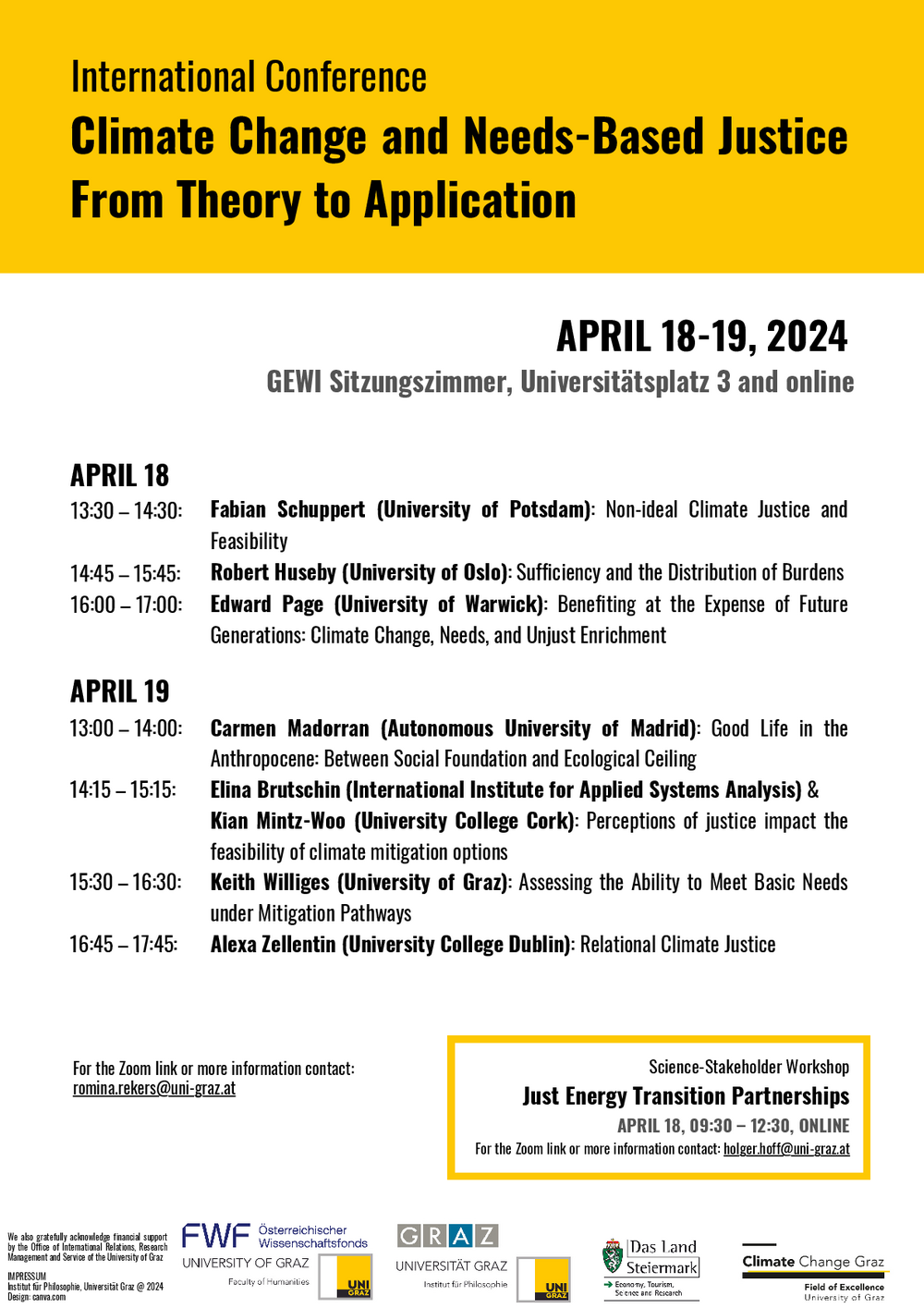
Virtues and the State - Non-material Principles of Eudaimonic Societies
Lecture by Prof. Andrej Zwitter
23 April 2024 | 17.00-18.30
Room SR 15.13, RESOWI B/I
The lecture and discussion will be held in English. You can receive the paper in advance. Please contact christian.hiebaum(at)uni-graz.at or katharina.hiebaum(at)uni-graz.at.
An event organised by the Institute of the Foundations of Law and the Section Moral and Political Philosophy of the University of Graz.
We look forward to seeing you there!
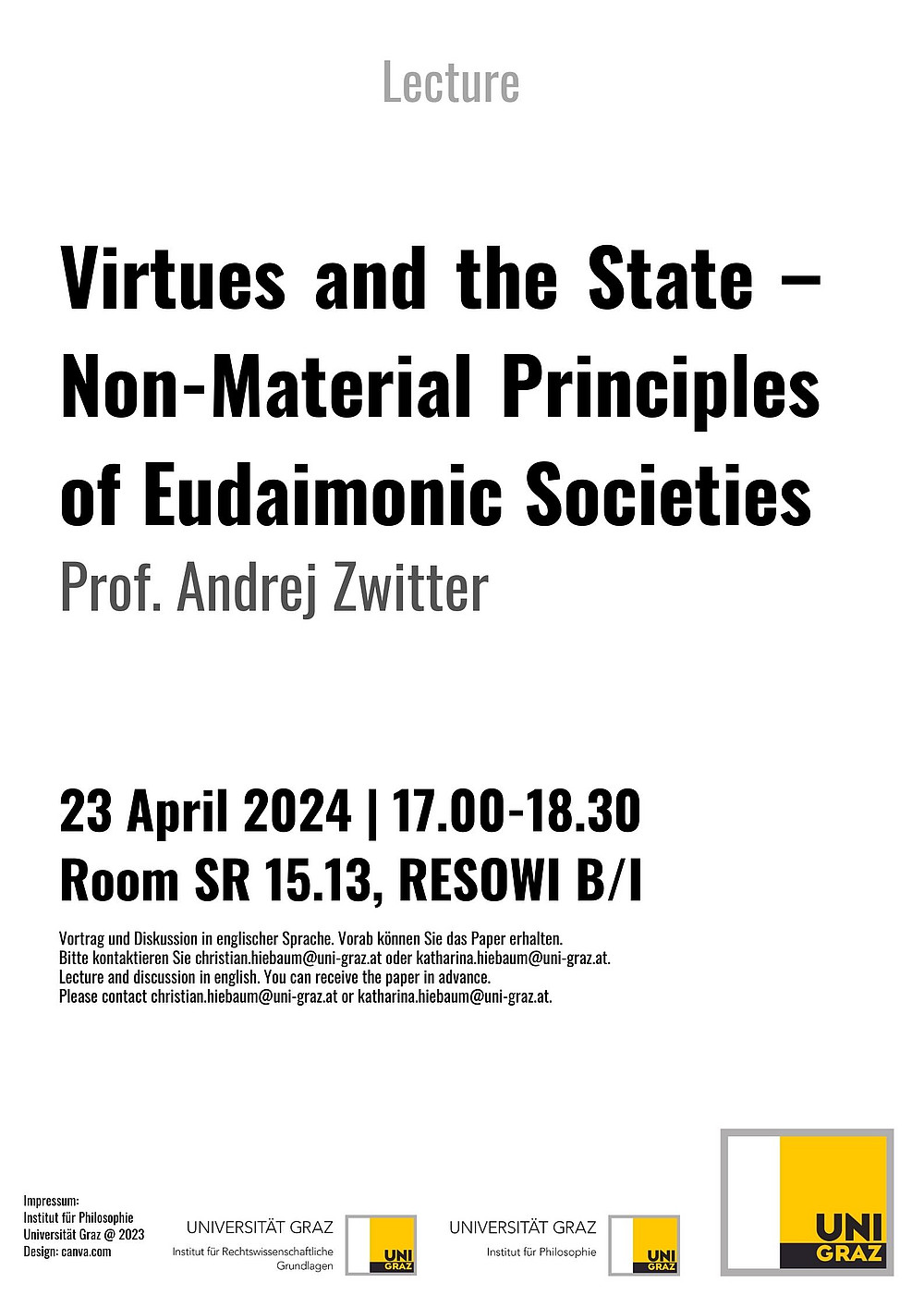
Hannah Arendt in Paris (1933-1940)
Book presentation and lecture by Prof. Dr. Thomas Meyer
In his lecture, philosopher and biographer Thomas Meyer will discuss the interrelationship between Hannah Arendt's thoughts and actions during her years of exile in Paris. In particular, he will focus on the connection between Arendt's reflections on modern anti-Semitism and her commitment to the organization "Kinder- und Jugend-Alijah", whose aim was to rescue Jewish children and young people abroad during the Nazi era.
Thomas Meyer is Professor of Philosophy at the LMU Munich. He received his doctorate there with a dissertation on Ernst Cassirer and habilitated with a book on Jewish thought between 1933 and 1938.
Since October 2020, he has been editing a twelve-volume study edition of Hannah Arendt's works, of which eight volumes have already been published. September 2023 saw the publication of "Hannah Arendt. The Biography", which is already in its fourth edition. The French edition is expected to be published by Calmann-Lévy in 2025.
09.04.2024, 5 p.m.
UR 09.51, Heinrichstraße 26/5th floor, 8010 Graz
An event organized by the Center for Jewish Studies in cooperation with the Department of German Studies and the Department of Philosophy at the University of Graz
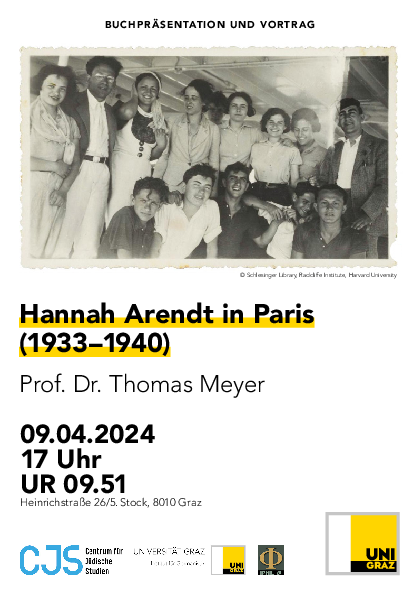
Ross Mittiga started as a university assistant at the Section in October 2023
Ross Mittiga is a university assistant at the University of Graz’s Department of Philosophy, and a member of Uni-Graz’s Climate Change Field of Excellence. Before coming to Graz, he held an assistant professorship in political theory at the Pontificia Universidad Católica de Chile’s Instituto de Ciencia Política. He received his PhD in Government from the University of Virginia in 2018.
Ross’s primary research centers on the political and ethical implications of the climate crisis. His work has appeared in a number of leading journals, including the American Political Science Review, Philosophical Studies, Contemporary Political Theory, and the Review of Politics, and has been covered in various media outlets, including the Washington Post and Wall Street Journal. His book, Climate Change as Political Catastrophe: Before Collapse, was published with Oxford University Press in February 2024.
Ross has served as an invited guest editor for the American Political Science Review (December 2023), and as co-editor of the Revista de Ciecnia Política (2022-2023). He has also served as an expert consultant for US governmental reports and as a reviewer for top journals and book publishers in the fields of political theory and ethics. Over the last five years, Ross has won a number of competitive external funding awards, including a Ramón y Cajal grant from the Agencia Estal de Investiación, Gobierno de España (2023), a Climate Change Postdoctoral Research Fellowship from the Climate Change Excellence Cluster at the University of Graz (2022), and a Fondecyt de Iniciación Research Grant from Chile’s Agencia Nacional de Investigación y Desarollo (October 2020 – October 2023).
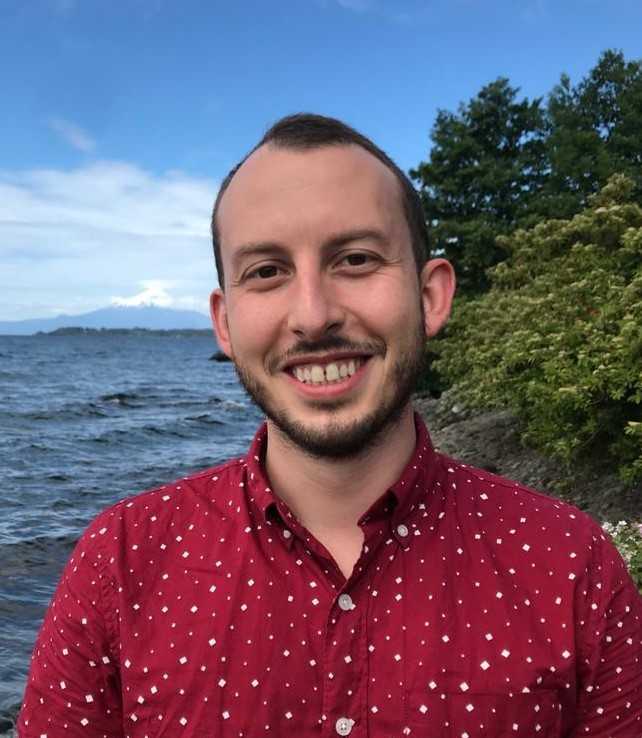
Ethics at the Interface of Future Generations and Nature
Workshop, 21st to 23rd of March 2024
Workshop, 21st to 23rd of March 2024
The workshop brings together experts in generational and climate ethics, animal ethics, and the value of biodiversity and nature. We will explore how issues in these research fields are interrelated and what we learn when we discuss issues from these often separate fields of inquiry together.
Speakers: Workineh Kelbessa Golga, Simo Kyllönen, Lukas Meyer, Keith Williges, Nadia Mazouz, Pierre André, Tongdong Bai, Angie Pepper, Markku Oksanen, Dieter Birnbacher, Ivo Wallimann-Helmer
Organisers: Nadia Mazouz and Lukas Meyer
Venue: ETH Zurich, Villa Hatt, Freudenbergstrasse 112, 8044 Zurich
21st to 23rd of March 2024
For more information click here

Lukas Meyer in Die Presse
Lukas Meyer in conversation with Die Presse about the distribution of greenhouse gas emissions: Results from the FWF project "Basic Needs and Intergenerational Equity", among others.
Article "How many greenhouse gases are each country entitled to fairly?"
